#but just distinguishing between them to see which ones are permanent
Note
Is Holly still strong even though they are not physically capable of doing much? Like can they crack stone on accident or something breaks in their hand even though it wouldn't break normally?
The infection wounds have left them severely weakened, so no, they're nowhere near as physically strong as they used to. On top of that, their ability to focus soul was also affected, they can heal minor wounds but they wouldn't be able to grow back their arm or fix the lasting damage. I think describing what exactly that looks like could be interesting.
I mentioned the arm so I'll start with that. The missing arm has affected their sense of balance, and while the prosthetic arm helps a bit, they'd still struggle with wielding their nail, and can sometimes appear a bit "wobbly". Their large head, while surprisingly light for its size, makes it even more problematic - it very clearly weighs them down, which is why they look so hunched over; if they take off their prosthesis, they'll often lose balance and trip when standing up, not used to the sudden lack of weight.
In similar vein, their hands are very shaky, indicating some nerve damage to their body. Makes sense, seeing how it was ravaged by the infection to the point of seeping through the cracks. They were able to mostly recover, but some of the damage was permanent. Anxiety makes it even worse, to the point where if they're stressed out, they find it incredibly difficult to hold anything in their hands - even the prosthetic arm, though it's worth mentioning that it's generally a bit more stable than the other.
Their vision is also impaired, their right eye is missing, which means that their depth perception has suffered, and in general they see in washed out colors. Not completely color blind, mind you, and it's still possible that they saw the world like that before due to their void nature, but the infection would certainly make it even worse. They can distinguish between color, but they struggle with more subtle changes in shade or hue - for that reason they prefer to draw in monochrome with pencils or charcoal, though they'll occasionally color their drawings with dyes (or just crayons I suppose, pencils exist in the AU so I don't see why crayons wouldn't). Sometimes they mismatch colors, for example, making the sky a mint green instead of cyan (random thought, but since they presumably live on a different planet, perhaps their sky is in fact a different color due to the atmosphere?). The previously mentioned trembling hands make it a bit difficult, so their drawings have shaky lines, but they don't let that discourage them - besides, it has its charm, as Grimm would tell them, since next to FPK he was one of the main voices encouraging them to pick up drawing as a form of expression.
When it comes to physical strength, they're still what you'd consider pretty strong compared to an average bug. They wouldn't just trip and fall if you slightly pushed them, for example, and they can carry quite a lot of weight. It's very possible that the damage to their body, particularly the nerves, would make it somewhat difficult for them to realize they're perhaps grasping something too tightly, so they could break something fragile without meaning to. But it's a far cry from their physical strength from before the sealing, where they could crack stone and even break bones easily with just their hands. They're strong, but far weaker than before, especially with their disabilities. In some ways, they don't even mind it - they don't really need all that strength, and the last thing they'd want is to scare or intimidate others. It can't be denied that they struggle with their impairments, but with their family there to support them, they don't really complain. They've been through much worse, after all.
25 notes
·
View notes
Text
Yours || Elvis Presley x reader
summary: Elvis makes good on his promise that he’d court once you were older, but now that he’s back in America, you’re worried about where his heart lies
word count: 2.2k
warnings: none really, illusions to age gap but nothing major
authors note: everyone thank my obsession with Elvis Presley for making me consistent with writing. i finally managed to spit out something that isn’t terribly sad and honestly, i’m in love with this one
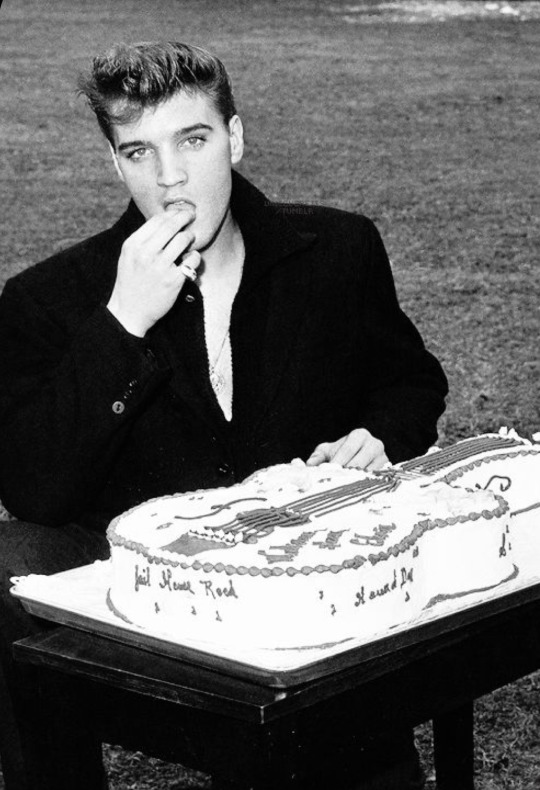
Photographers and news reporters mill about the grounds of Graceland like ants, chattering excitedly. It's March, and the air is cool, a typical Sunday afternoon in Tennessee.
Except it's not a typical Sunday because it's March 1960 and my boy is coming home.
Elvis was arriving back from Germany, and the entire world was celebrating. Just about very reporter in the state had flocked to the gates of Graceland to get a shot of him. The Colonel had set up a press conference to make a spectacle of the event, and someone had even sent up a cake for the occasion.
Although I was over the moon to see him again, a part of me was anxious. Though we talked daily, the time we had spent face to face only amounted to a handful of hours and only ever under the watchful eye of my father. And in addition, he was returning to the life he had left behind; the rockstar life with music, expensive cars, and girls—thousands of them. I feared that I was going to become a thing of the past; once again just the little girl he had met in Germany.
But still he insisted.
"Come live with me. Darlin', you would love Graceland. When I get home, I want you there. I want you there waiting for me when I walk through the front gate," he'd pleaded to me the last time I had visited Germany before he was discharged.
At first I was dumbstruck. We had both known that things could soon be coming to an end of the two of us. My dad had been permanently stationed in Germany and had intentions to move us there, destroying my chances of seeing Elvis anymore than I had when living in America.
But what would my mother say? Hell, what would my father say? Surely he would skin both of us alive if we proposed such an idea.
Before I could even begin to form some sort of coherent sentence, Elvis intercepted the reluctant argument on my tongue.
"Before you go arguin', I already talked to your daddy. With you moving to Germany and all, he thought it a decent idea. He knows just as much as I do that you don't wanna to move here. You've got a whole life waitin' back in the states. We've got a life back there waitin' for us."
And so when the time came, I tearily said my goodbyes to my parents and moved back to America, into a big house with a white picket fence and Cadillacs parked in the driveway.
During the few weeks that I spent waiting for Elvis to return from deployment, I got to know his parents, bonding with his mama over stories from Elvis' childhood and tending to the chores outside the house with Vernon. In a way, they became my parents too.
"Here he comes!"
The declaration pulls me from my spiral of thoughts.
Reporters and their heavy cameras buzz to life as the jabbering of the people clustered at the iron gates turns into frenzied screaming at the sight of the train of black cars turning down the drive.
Standing in the front yard with Gladys and Vernon, I smooth down the soft fabric of the dress that I'm wearing. I wanted to look presentable not only because his return was being broadcasted, but for Elvis. He always made a point to look his best, and in turn I wanted to look like the girl that belonged by his side.
As the line of cars comes to a stop in the driveway, I feel a prickle of the anticipation that has been building within me for days. Jerry glances back at me and sends me a wink.
With a dozen reporters crowding the second car in the line up, it's not hard to distinguish between which vehicle he's going to get out of. The door swings open and out he steps, greeting the reporters and smiling politely as he skillfully avoids the cameras being shoved in his face. Sonny and Red, as well as the rest of his entourage, do their best to move him along, flanking him from being bombarded worse than he already is.
He catches sight of his parents first, and Gladys hurries off of the porch to greet him, Vernon trailing not far behind.
He's taller, I think to myself, staying back as he covers the distance of the yard in just a few strides to embrace his mama. However, he quickly releases her, turning his head left than right to scan the crowd of people waiting to welcome him home.
I see his mouth move as he asks his mama something along the lines of 'Where is she—Where's my girl?"
My heart races within my chest as Elvis' searching eyes finally land on me and he breaks into a smile. Next thing I know, I'm running as fast as my dress will allow me across the yard. In an instant, I'm in his arms, colliding into him with such force that I'm amazed I don't knock him down. Instead he grabs ahold of me, swinging me around and lifting my feet from the ground. The flashing cameras and news reporters dissipate around us. Nothing exists outside of the soft velvet of his black coat against my cheek, his large hands on my body, and the musk of his cologne. His grip on me is crushing, but I would let him hold me like that forever if it meant he'd never let go.
"God, I missed you, mama," he sighs into my ear. "You got no idea how bad I've been needin' ya."
Our moment doesn't last forever though, and soon enough, Jerry is ushering Elvis along, breaking us apart. "Sorry, EP, but we've got to move this thing along. The Colonel already has you set up for the press inside," he says above the shouting of the reporters.
Elvis nods, but he doesn't release me, instead keeping one arm around my waist, tugging me to his side as he walks.
While the reporters set up their mics in Vernon's office, a cake is brought out in the meantime. A gift from the Memphis Press, the guitar shaped cake reads 'Welcome home Elvis!' in black frosting. With Elvis seated behind the cake for a couple of photos, his cousins waste no time in formally inducting him back home with their usual shenanigans. While he's distracted, Billy smashes a plate of cake to his face, and Elvis almost manages to escape it, the cake instead only catching the lower half of his face.
The press roars with laughter and the flashes of their cameras go off rapidly, catching the moment. Soon enough he's laughing too, cake smeared across his face as I lean over to kiss his cheek, all the while sucking from his thumb the frosting he had wiped from himself.
The look on his face for the rest of the day is jubilant, and he's all smiles and laughs as he answers the reporters' questions. Elvis doesn't let go of me for the entirety of the afternoon, either keeping his palm pressed against the small of my back or going as far as to sit me on his lap while the press interviewed him.
Now that Elvis was home, he had no intentions of letting me go. Of this I had absolutely no complaints. Even well after the reporters had left, taking their cameras with them, he was attached to my side.
"Let's go for a drive," he mumbled as I laid beside him later that night, attempting to get him to fall asleep. With the excitement of the day, I had assumed he would be exhausted, and he was, but as I had learned a while ago, Elvis often struggled with insomnia. We had spent many nights driving the empty streets of Germany until well past my bedtime.
I relent, and minutes later we are pulling out the gates of Graceland in his pink Cadillac.
We drive for probably a hour, chatting on and off, singing along to the quiet mumble of the radio when a good song comes on. It was as if we had not spent a single moment apart. I would have been content to drive around until the early hours of the morning with him—I would have been content doing anything with him—but finally he selects a spot to park.
With the car stopped, he eases back the seat until he's reclining back. Elvis pats his thigh, motioning his chin in my direction. "C'mon, mama."
And so I'm crawling over the seats of his pink Cadillac, until I'm settled comfortably in his lap, my knees bracketing his hips. Once he's content that I'm situated, he rest his hands behind his head, fully relaxing into the seat.
For a while we sit in silence, Elvis just staring up at the stars and me admiring him. Eventually his blue eyes become slits, narrowing until they flutter closed. At first I think that he has finally fallen asleep, but then he yawns, and his blue eyes crack open again.
He hums imploringly, looking at me through his dark eyelashes.
"Do you remember when we first met?"
Again, his eyelids fall closed, and he hums again. Only this time, negatively. "Uh mmm."
I gasp, grabbing his jaw out of reflex to get his attention. "Elvis Presley!!"
His eyes snap open, and he pulls my hand away from his face. It's then that I catch his smirk of mirth that was hiding beneath my palm.
"You were only seventeen."
My daddy had been an officer stationed at home in the states, but he was going to Germany for some business. At farewell party held for draftees, I'd met Elvis just before he too, was shipped to Germany.
At seventeen, I was young for my grade and almost out of high school. Left alone at the party while my father chatted with his old comrades, one of his soldiers, who happened to be a family friend of ours and a mutual friend of Elvis', introduced us.
Almost immediately, I was swooned by his charm. Elvis, on the other hand, was not convinced.
"Little girl, you're just too young," he had eventually confessed to me at the end of the night. "Maybe when you get outta school, I'll write to ya, but not now." And he had left it at that, disappearing to Germany for an entire year without making contact with me.
The following summer, he sent me a letter.
Dear Miss [L/N],
I am pleased to write to you that your daddy is doing well. We are stationed not far from each other and have become close confidants. Our main topic of conversation is you. I promised to you that we would talk again after you graduated from school, and I am a man of his word. I hope this letter finds you well and open hearted.
yours,
Sgt. E. Presley
After receiving his letter, we kept in close contact for the remainder of his deployment; even making calls when letters were not enough.
"So sweet," Elvis recalls. "With a mean streak." I squeal when he roughly grabs hold of my hips.
I blush, swatting him away as I protest. "I was not!"
Admittedly, he wasn't wrong. We did get to see each other between the time he left for Germany and when he came back. My dad would fly myself and my mother out every so often to visit him, and we would attend the military balls in the evenings.
Often the soldiers would avoid me at all costs. My dad didn't have to worry about me attending such gatherings because he knew what a spitfire I was. I had a mean reputation amongst the soldiers stationed in the area. It was mostly the young recruits who often walked away from conversations with me, licking their wounds after making some vulgar or sexist comment. Because he too was a man himself, Elvis was sometimes on the receiving end of such interactions. But he was respectful and able to hold his tongue around me for the most part.
Elvis chuckles and pats my thigh, wrapping a large hand around the back of my knee, tugging me further onto his lap. “C’mere, mama. It’s been too long since I’ve held you.”
Like putty in his hands, I allow him to embrace me, tucking me close into his chest. He hugs for a second time today, just the same way he did in the front yard this afternoon. It’s the same way he’s hugged me since the first time we had to say our goodbyes in Germany years ago and every time since then. It’s not tender or gentle, but bearish and consuming, as though he’s putting his entire being into the embrace. I never ask him to let go, always willing to wait in his arms until he decides that we can’t stay that way forever.
The temperature has dropped a few degrees but the heat from his body and his half open velvet coat are enough to warm even my insides. As our bodies slowly become one, I hear his breathing even out against my ear, and his heart slows to a patient thrum between our bodies. Still dressed in our clothes from the previous day, we fall asleep together under the stars in the drivers seat of his car.
#elvis 2022#elvis presley#elvis presley x y/n#elvis presley x reader#elvis presley imagine#elvis presley fic#elvis fluff
392 notes
·
View notes
Note
since we are introduced to all of the Sins' kids. I feel like Tristan is a bit meh. Don't get me wrong he's a nice character and all but he's not that interesting sure he has troubles with his demon side but I myself saw that one coming but really that's all he has and we basically already know much about him. Lancelot has his own character mystery which is an exciting thing to explore. The Kiane kids will be supporting characters at most so I'm not expecting too much but Nakaba is doing a good job with writing them and distinguishing each of their characters considering there are 7 of them the twist Nakaba did in this arc also made things interesting for the characters involved. I saw a theory @winterlogysblog posted about the whole Nasiens and Mertyl situation being sus which is an interesting thing to look into. Sixtus is slowly being introduced as a powerhouse sure he got stabbed in this current chapter but with the way Nakaba hyped him up, it would only make sense for a Peril to beat him which for a supporting character is a high bar to be on for a first introduction.
But Tristan is rumored to be in prison so shakes things up a bit and I hope that'll make his character a lot more interesting for me at least
Tristan is definitely going to have changed quite a between we see him again in the timeskip .
If he really is imprisoned by arthur then we have no idea.
No idea what kind of physical or psychological torture he could've gone through .
Arthur could be exploiting his magic to use it for himself .
Or he could be toying with him and mocking him with chaos showing him all kinds of horrors.
He could show Tristan when Meliodas and Zeldris his beloved father and uncle terrorising britannia .
Or he could show Elisabeth in her Bloody Ellie days, slaughtering people without mercy.
Arthur could actually RUIN the relationship between Elisabeth and Meliodas and actually has the opportunity to TRAUMATISE one of the Four knights of the apocalypse permanently .
If Tristan is REALLY being imprisoned by arthur, I am both excited and terrified to see him again because if he really is he won't be the same little bean he was before :( .
( I rlly hope he's just ran off to try and master his powers or smth and that he's not being tortured by arthur )
Thanks for the ask
Keep the em oming you guys !
#nanatsu no taizai#mokushiroku no yonkishi#4koa#seven deadly sins#percival#lancelot#tristan liones#gawain
19 notes
·
View notes
Text
Note: when I say radfem, I am including all subsets of radical feminism, including terfs and gender criticals, because with the rare exception, on this website, they are all the same thing.
Radfems think most forms of permanent body modification should be illegal - there are exceptions I'll get to later. Many are 100% against elective plastic surgery, against tanning, against little girls getting earrings. Some of them don't like temporary body modifications either, including makeup and shaving, but it depends on how much of a tradfem they are; tradfems like those last two things.
Now here's a fact: beauty industries absolutely are pushing traditional patriarchal beauty standards onto women. There are absolutely valid criticism to make about these industries and the harm they cause and the vulnerabilities they capitalize on.
However, many radfems who are against body mods take it one step further. They believe that any female who gets a body modification is only doing it because of misogyny. This leads to the belief that the only way to escape misogyny, the patriarchy, and sexism, is to exist in your body completely "naturally" with absolutely no modifications whatsoever.
And I get it. I get where they're coming from. I was raised female too, I've been seeing ads aimed at me to remove my pores since I was 10 years old. The urge to lay completely naked in a field with no fashion, no makeup, no pressure to conform, is huge.
So yes, feminism of all kinds IS concerned with body modifications that try to force a woman to be conventionally attractive according to the patriarchy - pale but just tan enough to look "healthy", nails that are manicured but not too long, skinny but with the "right" curves, long blonde hair, blue-eyed, perfect makeup that looks like you don't have on makeup - a beauty that is at once highly cultivated but appears effortless and "natural". Encouraging women to conform to a patriarchal idea of beauty is a problem, and the beauty industry takes advantage of a demand put there by the patriarchy.
But not all body mods make a woman "conventionally attractive". Dyed hair in crazy colors, piercings, tattoos, subdermal implants, tongue splitting, these are all things that I think most people are able to recognize do not conform to the patriarchy's ideal of a pale blonde woman with perfect breasts and hips.
And I think most radfems are able to distinguish between these two kinds of body mod: they can recognize that "oh yes of course tattoos and piercings and purple hair is ok, you're fighting the patriarchy when you do that".
So why do they lose this perspective when it comes to GNC and trans people?
Like top surgery - how is removing breasts conforming to the patriarchy? It's inherently not - so much so that doctors performing breast reductions on cis women routinely violate their patient's consent and don't remove as much tissue as they're told to remove.
What about the effects of testosterone? Facial hair, a higher hairline and a deep voice are not feminine ideals according to the patriarchy, but radfems have a problem with it anyway.
It's funny, honestly. They cry about how women shouldn't be pressured to do body mods that force them into ideal femininity... but then get disgusted when people get body mods that remove them from ideal femininity.
Radfems express not just concern but disgust when it comes to the changes female trans and GNC people undergo. They cry about how it "ruins" a "beautiful young girl" and "destroys her fertility" etc... which are the exact ideals they claim to be fighting against. But when the person is GNC or trans, suddenly traditional femininity is a good thing.
And of course their hypocrisy extends to trans women, too - suddenly, the idealized female form is absolutely "inherent" and no "male" could possibly achieve such delicate femininity.
It's just a little bit funny.
#trans#transgender#transmasc#trans masc#ftm#trans man#non binary#nonbinary#gender#genderqueer#gender liberationist#gender liberation#anti radfem#anti terf#anti gender critical
214 notes
·
View notes
Text
Round 1 poll 32: The Phantom of the Opera from the Best of Andrew Lloyd Webber CD/OP's mind vs Vladislaus Straud from the Sims

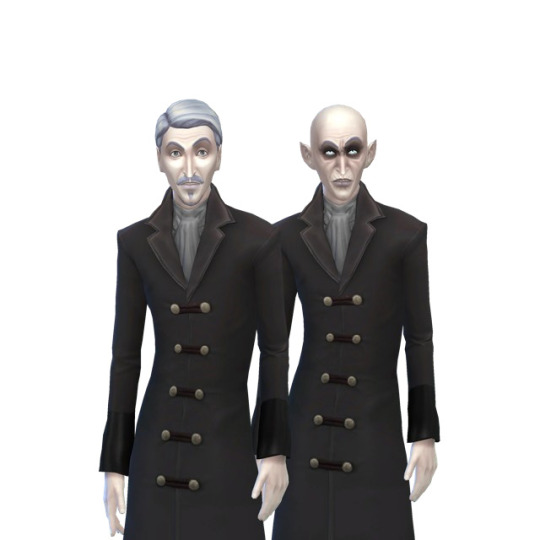
Propaganda under the cut:
Phantom of the Opera:
Ok so when I was little my mum had this best of Andrew Lloyd Webber CD she would play in the car quite often. I had no clue what stories any of the songs were from but I liked listening and I could pick up on the fact that several were parts of a set. From The Phantom of the Opera we had the titular song, Music of the Night, and All I Ask of You. I knew from general cultural osmosis that the main character was Christine, there was the phantom of the opera, and then there was a guy called Raoul and that he and the phantom were in kind of a love triangle for Christine's love. Anyway I had trouble distinguishing between Raoul and the phantom's voices so I thought that all three songs were just the phantom and that instead of All I Ask of You setting the two men up as foils, it was character development for the phantom. And if he was a good guy who would have such a tender love song, obviously Raoul was the big bad of the show. I imagined in great detail over many car rides to and from school a version of the show where the phantom was Christine's friend who lived in the walls and while he was kind of skittish and eccentric from the isolation, he was genuinely a good person at heart. One day Raoul shows up and he's rich and good looking and kind of a Gaston archetype, and he seems to be taking an interest in Christine, which the phantom doesn't like because he's secretly been pining after his best friend all these years, so despite his fears the phantom invites Christine into his underground lair where they can finally meet in person instead of talking through the walls (The Phantom of the Opera). She's a little nervous but they bond over their shared interests (The Music of the Night) and it seems to be going well up to the point where she sees his face behind the mask and freaks out, leading him to also panic. When she asks to leave, he's like "uh, no the idea was for you to live down here permanently with me, especially now that you've seen my face." She's hurt and betrayed that he would be so controlling and they have a big fight which culminates in him reluctantly letting her go and them not talking to each other for a while. In that time, Christine gets engaged to Raoul and the phantom watches them from the shadows.
He's distrustful of Raoul but believes it to be his personal jealousy clouding his judgement until he sees Raoul sabotaging the set of one of the plays and tries to stop him, but ends up getting blamed for injuring the other opera stars himself. Christine and Raoul fight about the details in the story that don't add up, and Raoul reveals that he doesn't really love her, he's just after her money and status, but there's no way out of this marriage now- in the eyes of society she will soon be his possession. But surprise! Here comes the phantom to save the day! He offers to hide Christine from Raoul in his underground lair and help her break off the engagement from a safe place, but this time it's her choice and she can come and go as she pleases. He's really sorry for how he acted and he understands that he can't demand her love but he doesn't want to live a life without her in it, just being by her side and being friends again would be enough (All I Ask of You).
She agrees and they make up and they successfully kick Raoul out of the opera house. She says she does love him but she doesn't want to live her life underground and he doesn't think he'll ever be ready to join society so they part ways again at the end of the play, but he leaves her with a ring so that she'll always remember him and the bond they share. Years later she dies, and the ring eventually makes its way back to the opera house where it's sold in an auction (I knew vaguely that there was an auction at some point in the stage play but I had no clue where so I put it here?). The phantom sees this and concludes that Christine must have finally forgotten him, and he is so distraught that he burns down the entire opera house with him inside (Don't judge me for the weird ending I was 10 and thought this was the deepest most tragic thing ever). So yeah! I was totally enamored with this version of the play that I had completely fabricated from three out of context songs, to the point where I was actually quite disappointed when I finally watched the real show. Watching encanto a couple years ago was actually really cathartic because finally I could watch something at least somewhat similar to my personal blorbo version of phantom where he was a cool chill guy who happened to live in the walls. Also sorry this answer got away from me if you read all of this thank you ily hope u enjoyed this ride thru my tweenage psyche - idk how this would actually be able to be used in a bracket in retrospect but I really enjoyed writing this all out it was a real trip down memory lane
Vladislaus Straud:
An evil loner who plays the organ, he is the elder vampire who breaks into people's houses and drinks their blood. A threat to society. He may or may not have committed mass homicide in the past. I love him. I want to bite and choke him. Non-sexual way, just pure violence. I want to pet him on the head and punch him. I want to break into his mansion, play on his stupid air piano until he is irritated, beat him up, steal his coat, hug him (twice), steal his painting and maybe kick him. Not gonna lie, he looks like he's pretty soft to the touch. He could canonically use a hug. Actually. I'm not even kidding. He also looks like Nosferatu sometimes.
28 notes
·
View notes
Text
Trigun Bookclub: Trigun Vol.1-2, Chapter #10
previous | all
I’m doing a deep-read of the Japanese original print (reread) and Overhaul 1.0 (first read) side-by-side, and writing down everything I notice from small details, version differences, translation differences, etc.
The volume numbers will be mismatched for most of the remainder of Trigun, since the Japanese first edition is 3 volumes while all later versions are 2 volumes.
As always, here are the non-analysis panels:
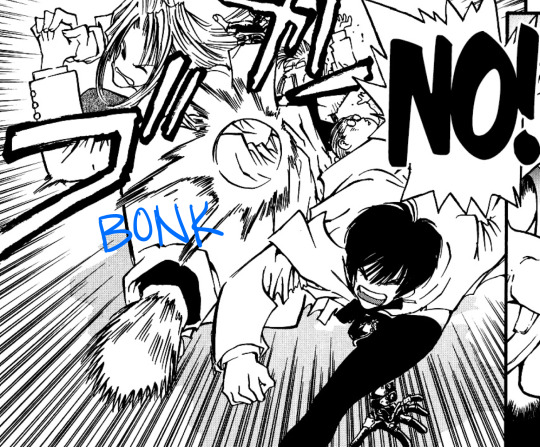
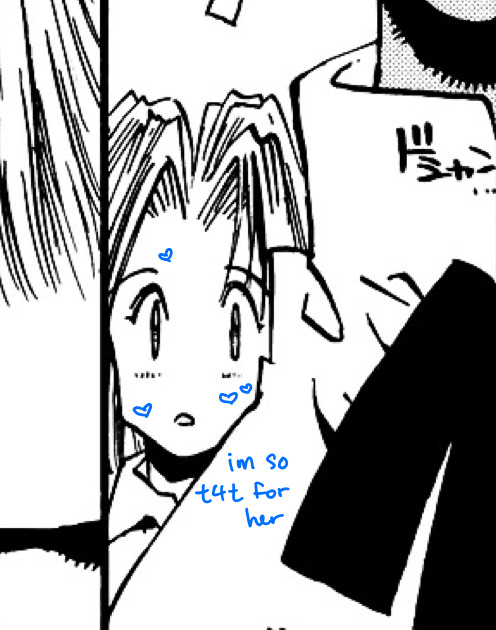
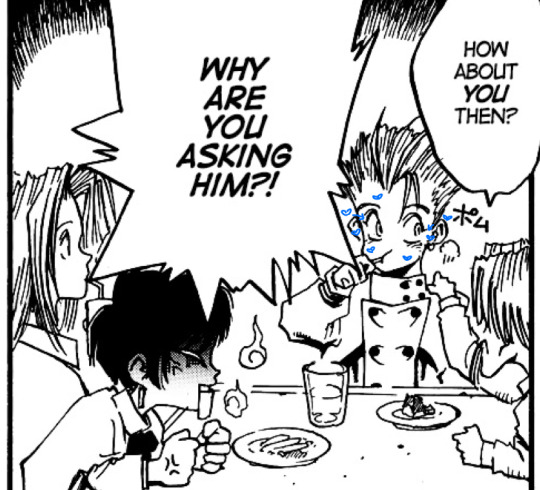
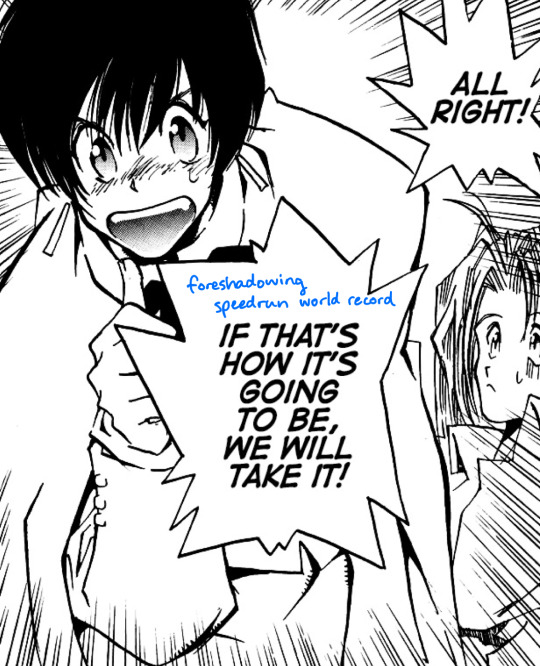
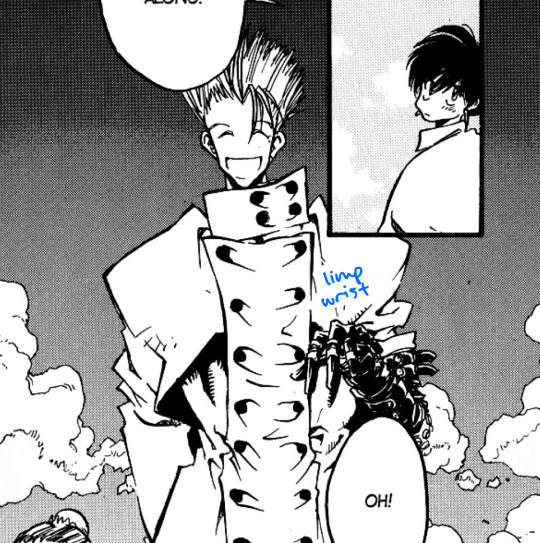
And the rest is under the cut.
[link for if the images aren’t in horizontal rows]
A lot of annotation transcriptions for this entry.
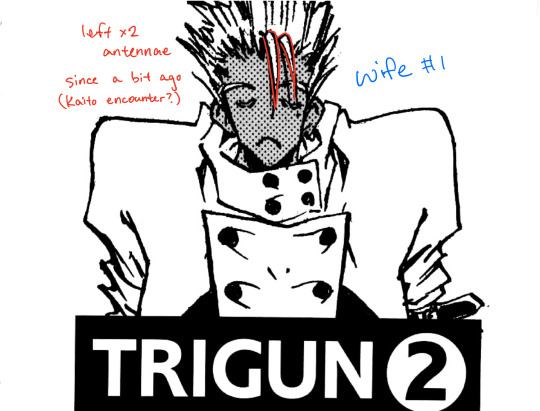
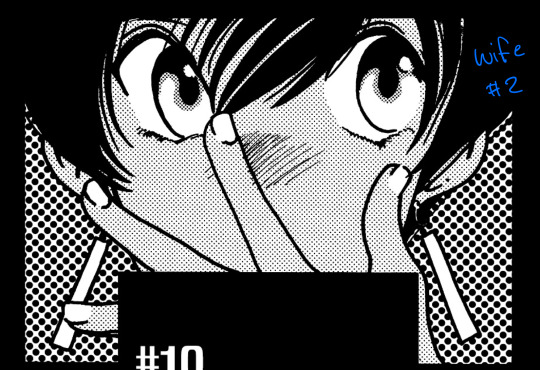
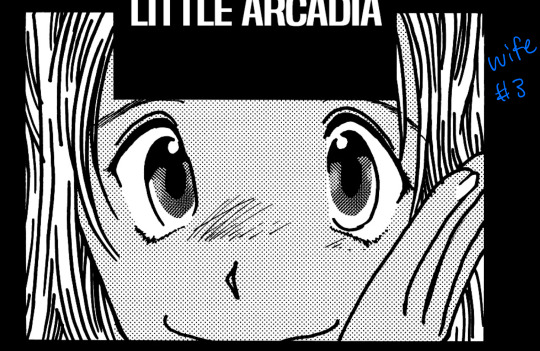
My 3 girlies!!!!!!!!!!! Ever!!!!!!!!
I was waiting for Vash's antennae to go back up, but it looks like 2 of them are permanently bent now. I think it's stayed half-bent since his first encounter with Kaito in the last arc. Haven't double checked to make sure though.
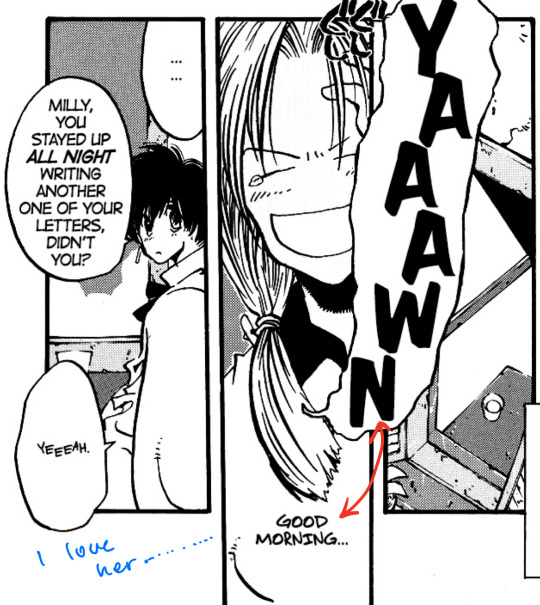
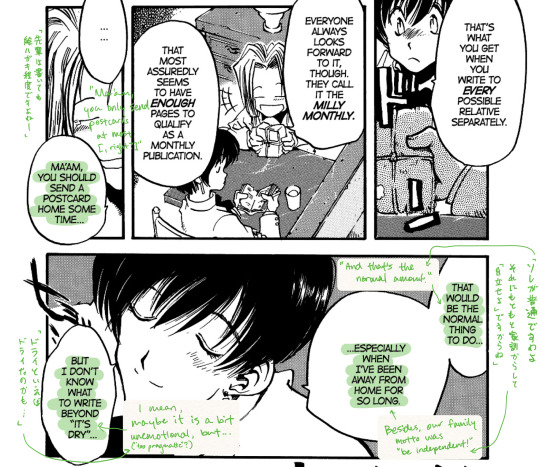
Milly my beloved..... (I keep spelling it Millie every time. help)
In the Japanese version, the speech bubble is "good morning," but in a barely comprehensible yawn. The yawning onomatopoea is written in small text.
Various translation corrections -
「先輩は書いても絵ハガキ程度ですよねー」
"Ma'am, you only send postcards at most, right?"
「ソレが普通ですわよ それにもともと家訓からして「自立せよ」ですからね」
"And that's the normal amount.
Besides, our family motto was 'be independent!'"
「ドライといえばドライなのかも…」
"Maybe it could be a bit unemotional/pragmatic [now that you mention it], but..."
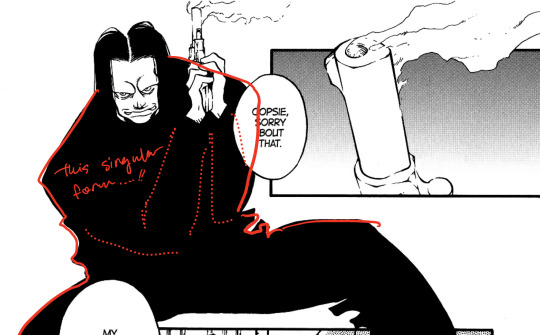
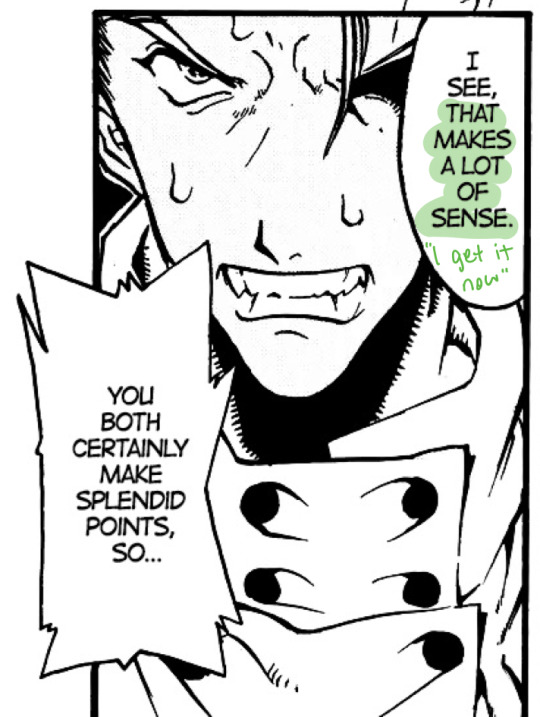
Badwick's first appearance. Just looked ahead to check his name... I forgot how stupid it is... Badwick......
The first time we see one of my favorite art style aspects, single forms!! Love seeing black blocks and non-distinguishable limbs!! This is used a lot with Wolfwood's suit and I love it so much...
I would say Vash's line here is more like "I get it now."
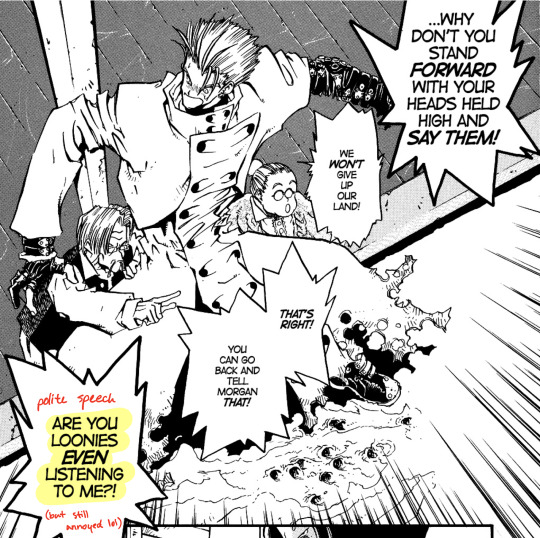
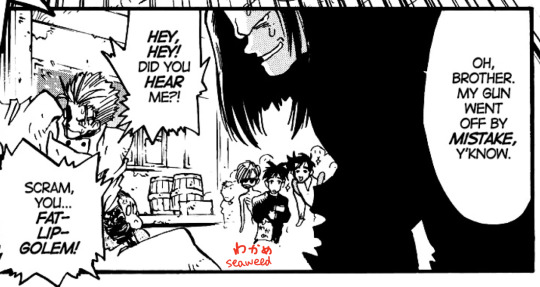
Images I can hear!! I loved this scene in '98... 聞いておるのかご老体!!
By the way, Vash uses polite speech here, but in a (half-)sarcastic way. (If that makes sense...)
The background mob in this panel is... unique for sure. Skin-and-bones, some guy holding (eating?) seaweed, and a sparkly prince?
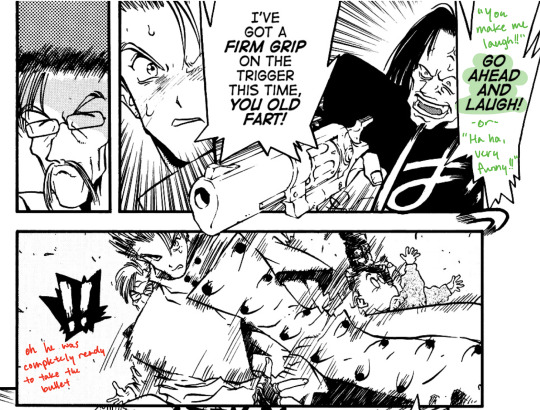
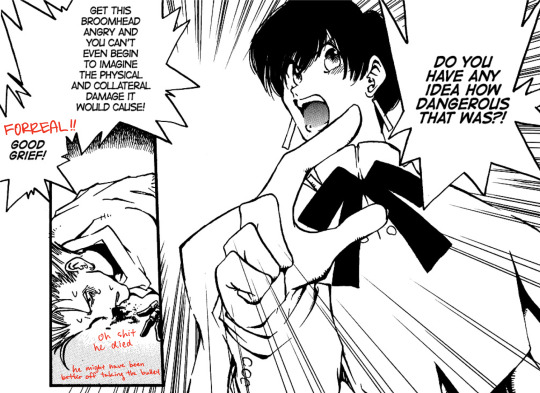
Badwick's「笑うね!!」line here is more like "You make me laugh!!" or "Ha ha, very funny!!"
I know Vash jumping in front of the old couple is probably intended to just be an instinctive act of protection, but thinking about my analysis in the previous arc (#08 I think?), I can't help but think about his self-sacrificial tendencies...
On a lighter note, Meryl ends her rant with マヂ(ジ)で!! which is kind of like... "FR!!" lol
Also Vash is literally dead. Honestly he might've been better off taking the bullet than getting bonked.
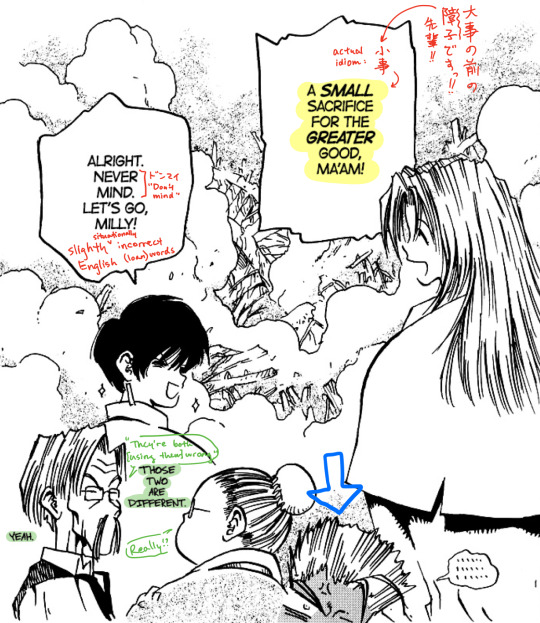
Classic MillyMeryl manzai routine (not a single braincell between them). Featuring a pissed Vash.
Milly's joke is a bit hard to translate.... She's actually saying an idiom wrong. The correct phrase (what she says in Overhaul) is 大事の前の小事, which literally means "a small event before/in front of the big event." (this idiom is also an contranym but I won't get into that lol)
However, the kanji she uses for 小事(shōji, small event) is switched for 障子(shōji, wood-and-paper sliding door). They look the same in romaji, but they have different tones.
Meryl's response uses English loanwords/Japanglish that's all slightly incorrect for the situation.
So, the Gramps's comments are about the fact that they're using the words wrong. Apparently Granny didn't notice!? lol
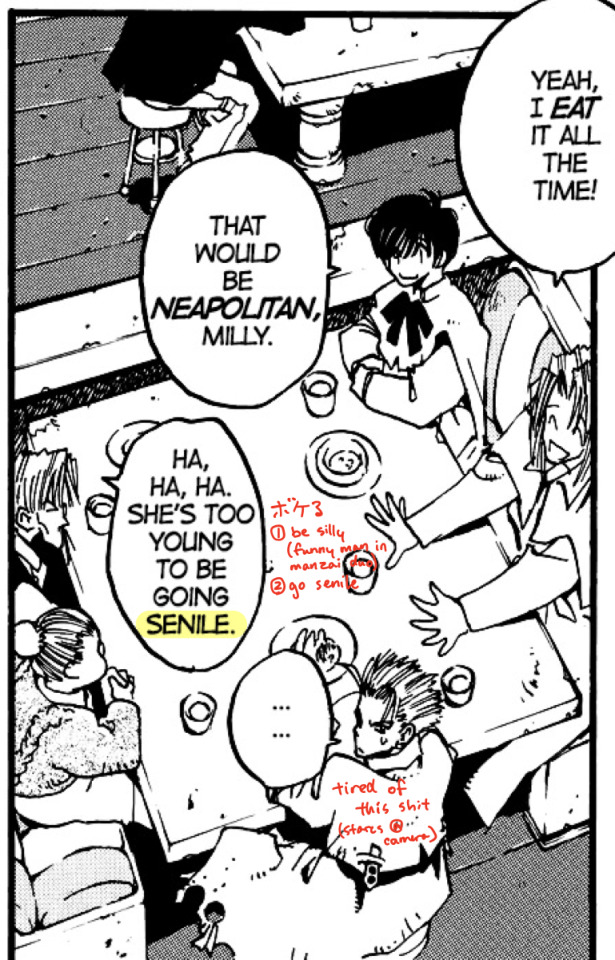
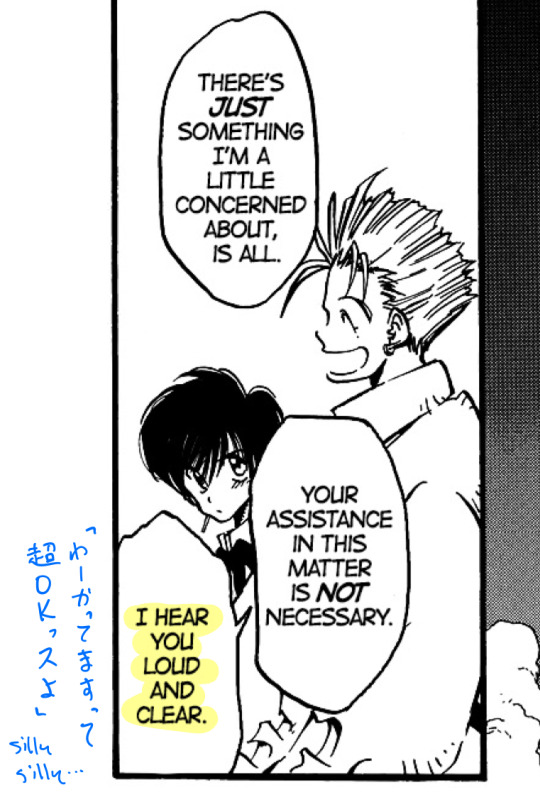
Another silly Milly...
Gramps's line is a sort of double-meaning, since ボケる(bokeru) means both to be silly (as in the funny man role in manzai)(which Milly has been doing throughout) and to go senile.
I love how Vash is 100% tired of this shit and just stares at us.
Japanese-only thing, but I love how he says「わーかってますっ��� 超OKっスよ」. silly goober....
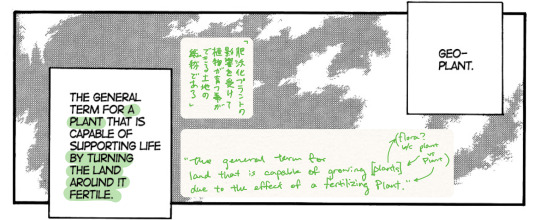
「ジオ・プラント―― 肥沃化プラントの影響を受けて植物が育つ事ができる土地の総称である」
"Geoplant— The general term for land that is capable of growing flora due to the effect of a fertilizing Plant."
The term "geoplant" is actually for the affected land, not the Plant itself. Which is... confusing to be honest....
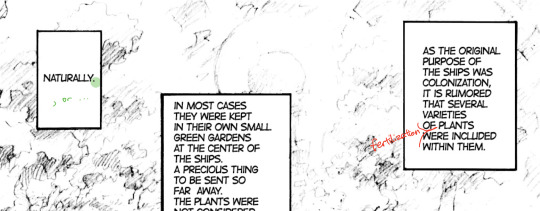
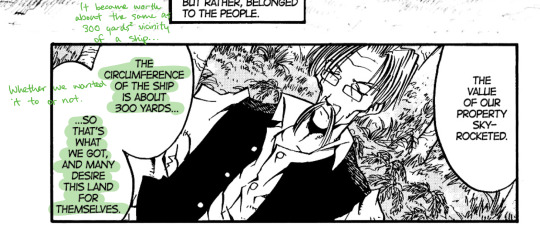
The Plants mentioned here are the capital P generator Plants, not lowercase p flora plants. This line means that among the Plants on the ships, some of them were also of the fertilization variety necessary for geoplant land.
"Naturally" is continued into Gramps's line, so it should end with an ellipsis.
He says that the property became worth about the same as the area of a 300-yard radius around a ship (which I would imagine is INSANELY valuable), whether they wanted the price to rise or not.
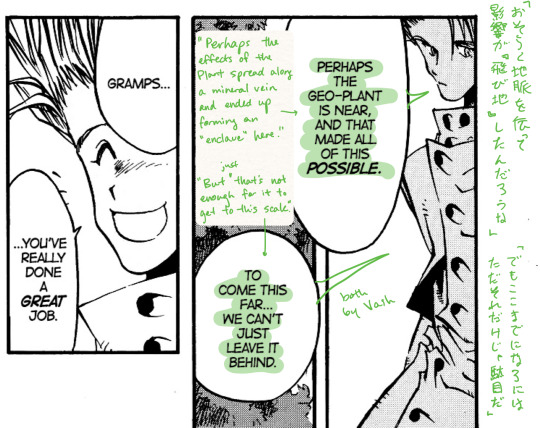
These two lines are actually by Vash.
「おそらく地脈を伝って影響が『飛び地』したんだろうな」
"Perhaps the effects of a Plant spread along a mineral vein and ended up forming an 'enclave' here."
「でもここまでになるにはただそれだけじゃ駄目だ」
"But just that's not enough for it to get to this scale."
I love how quickly he could tell this is a geoplant and recognize how much work and love the couple has put into it.
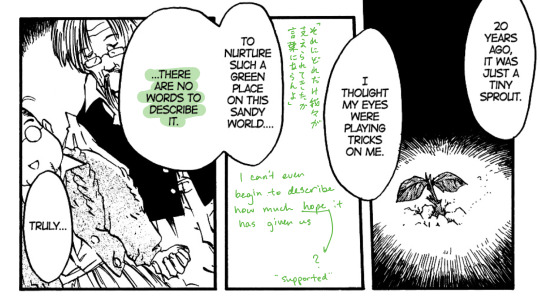
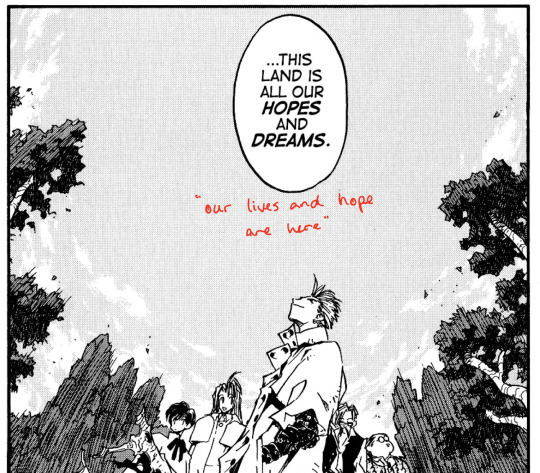
「それにどれだけ我々が支えられてきたか言葉にならんよ」
"I can't even begin to describe how much hope it has given us."
The word he uses is actually "support," but I couldn't think of a way to make it sound decent other than the next closest word, "give hope."
Not really a translation fix - in Japanese, he says something more like "This is where our lives and hopes are."
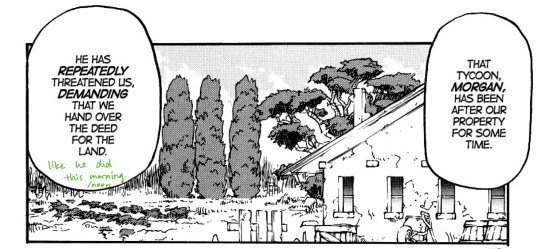
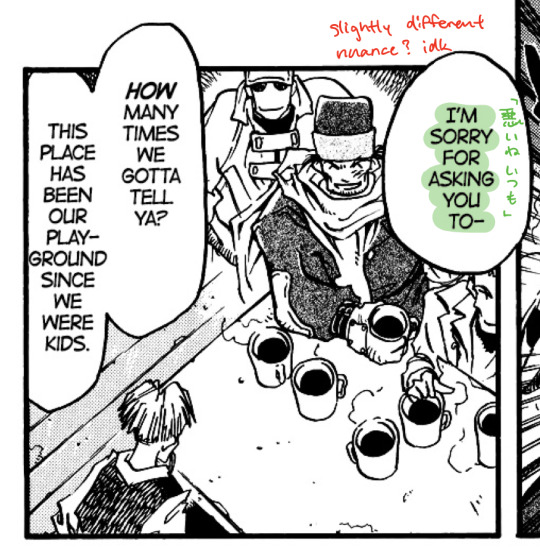
I missed it during the annotation (will mark it later), but I think the article for "tycoon" should be "the" or "a," since Morgan hasn't appeared yet.
Gramps mentions that the incident from earlier that day was also one of Morgan's threats. (The annotation should be "like what happened this morning/noon." Will also fix that later.)
I feel like this line by Gramps comes across as a bit too harshly apologetic in English compared to the original? I'm not sure how to convey it accurately though... it's more of a Japanese cultural thing.
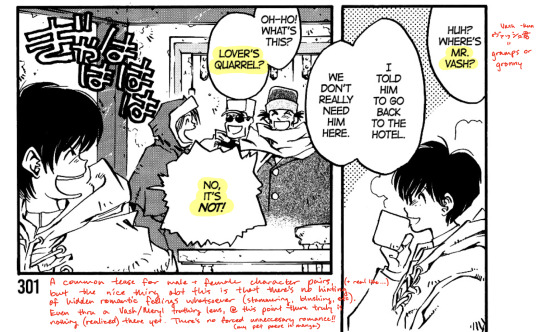
The first speech bubble is probably by one of the elderly couple, most likely Gramps, since it says "Vash-kun". Milly calls him "Vash-san."
Also about the "lover's quarrel" tease and Meryl's response:
A common tease for male+female character pairs (and real life...), but the nice thing about this is that there's no hinting of hidden romantic feelings whatsoever (stammering, blushing, etc.). Even through a Vash/Meryl truthing lens, I think at this point there truly is nothing (realized) there yet. There's no forced hetero-amatonormative romance!! (my pet peeve in manga)
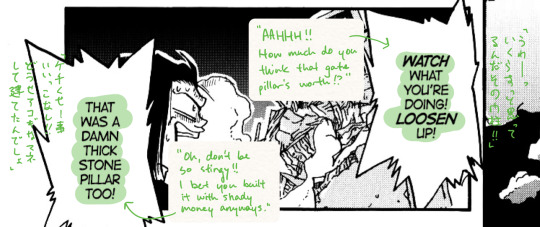
These lines are actually an exchange between Badwick and Marilyn.
「うわーーっ いくらすっと思ってるんだその門柱!!」
"Aaahh!! [Watch what you're doing!] Just how much do you think that pillar's worth!?"
「ケチくせー事いいっこなし!!どうせアコギなマネして建てたんでしょ」
"Oh, don't be so stingy!! I bet you guilt it with shady money(/through shady means) anyways."
And that’s it for Chapter #10!
As always, the Japanese annotations will be in the reblogs.
#EDIT: I LABELED THIS AS CH9 (ITS CH10) AND DIDNT NOTICE FOR A MONTH SORRY#this ones kinda boring lmao#already said most of the stuff i want to say in the annotation...#btw all my annotations will be revised to match the bookclub entry before theyre distributed into pdf#thats what i mean when i say fix later#trigunbookclub#trigun annotation#trigun#trigun manga
26 notes
·
View notes
Note
What is it that causes people to determine whether a story is a "deconstruction" or has deconstructive elements in it?? There doesn't really seem to be any specific rhyme or reason behind how it works, and half of the time it feels like the main reason people see something as a deconstruction is because some other big YouTube personality tells them, and then they just regurgitate that as fact.
so here’s the thing—and it’s a recurring pattern, i don’t mean to pick on you specifically for it—but i dislike this mindset that all poor or unsound or bad faith or even just clumsy analysis in fandoms is the consequence of people being idiot sheep mindlessly regurgitating what the big bad youtubers say.
i think i’ve made my position vis-a-vis fanon ‘analysis’ pretty clear (namely that most fandom-produced meta isn’t analysis because fandom is transformative by nature and the approach to the text is different, and that my personal distaste for fandom is predicated on fandom’s cultural disregard for the text, hostility toward real textual analysis, and the refusal or failure to distinguish between analytical and transformative engagement which socially rewards nakedly antitextual “analysis” if it taps into popular fanon).
i do not watch youtube video essays. i have never felt an interest in doing so. i cannot imagine what the appeal could possibly be. i would, frankly, exist in a permanent state of Not Thinking About Youtube were it not for the rwby fandom’s inexplicable fixation on youtube video essays. i feel an unshakable and possibly baseless conviction that you folks are the weird ones here, not me.
anyway no people don’t slap the ‘deconstruction’ label onto everything willy-nilly because they’re idiot sheep who’ve been brainwashed by the evil youtubers. they do it because ‘deconstruction’ was an ill-defined and nebulous textual approach even before it percolated into fandom and sparked off the trend of narrative cynicism which is endemic not just in fandom but in the modern entertainment industry itself, largely as a consequence of executives prioritizing profit over artistry and rampant anti-intellectualism.
to deconstruct is to disassemble and examine and fandom prides itself on both disregard for the text (“fuck canon!”) and strip-mining stories for spare parts to glue together into the mold of fanon archetypes. and you’re surprised that people in fandom widely misuse and misapply the concept of deconstruction?
12 notes
·
View notes
Text
Phantom Goes Cross-Country (Chapter 2)
Summary: Danny and friends make a quick stop at a gas station. Surely nothing can go wrong there!
Words: 993
AO3 Link
"My turn to drive. Pull over." Danny could see Tucker's eyes getting heavier and heavier as the night drew on, and he wasn't too keen on getting into a car accident. Especially not in the middle of nowhere, in the dead of night, on a road they hadn't seen another car on in half an hour.
His whole time living in Amity Park, he never realized how isolated it was from the rest of the world. Maybe the ghosts had something to do with it. Maybe it was coincidence.
Tucker squinted at the fuel gauge for a moment. "Fine, we'll switch. What'd the sign back there say?"
"Next gas station's in 2 miles. So… quarter of a mile left?" A completely bullshit answer. It was less than 2, greater than 0. Tucker couldn't prove Danny wrong in his half-asleep state, and that's what mattered.
"Thank god. This baby needs fuel, and so do I. If I don't get a Red Bull, I'm gonna pass the fuck out."
Danny scoffed. "You need sleep, not caffeine."
He glanced down at the car's clock. Nearly 11 PM. If not for the fact that he'd been on a near-constant adrenaline rush for the last few days, he'd probably have fallen asleep by now. But here he was, in the car with his two best friends, going on a roadtrip and leaving Amity behind for the first time in ages. It wasn't permanent, as much as he desperately wanted to never step foot in the Nasty Burger again, but a break from flipping burgers and dealing with Dash was all he really wanted.
In the distance, the florescent lights of the gas station began to light up the side of the road. Danny basked in the unnatural glow as Tucker pulled up next to one of the pumps.
Tucker got out of the car and stretched with a long, exaggerated yawn. "Do you want anything?" He tossed the keys to Danny.
"Soda. Any kind. Which one of these is for the gas cap?" He held the keyring up to the light, as if that would help him distinguish the right key among what seemed to be every key Tucker had ever owned.
"The small one," Tucker said, as if it was obvious, and went through the glass doors of the convenience store. Danny got the right one eventually, after trying about twelve different "small" keys. He leaned against the car and waited for the tank to fill up. His eyes wandered over the advertisements for cigarettes, slushies, and bags of ice until the word "marlboro" stopped making sense.
Then he saw something move. Out of the corner of his eye, in the shadows of the building where the overhead lights weren't strong enough to reach. Something had moved. He'd been dealing with ghosts long enough to know that if he turned to look, all he'd see was concrete. Sure enough, this was the case.
No. He wasn't in Amity anymore. Not everything had to be a ghost lurking around the corner. He was probably just tired from staring at the open road.
His attention snapped over to Tucker leaving the convenience store with a bag in one hand and a can of Red Bull in the other. He paid for the gas and crossed his arms.
"You're not drinking that."
"Why not? You're gonna fall asleep too if you don't have someone to talk to."
"The radio can keep me company. Come on, you need sleep."
Tucker cracked the can open and lifted it up to his lips, challenging him to make a move. "I got a degree in computer science, Danny. If anyone here knows how to go without sleep for 48 hours, it's me."
Danny snatched the can out of Tucker's hands and bolted away, until there was a sizable distance between the two. Enough that he could keep his prize if his friend decided to chase after him. If Tucker wanted to crash and burn, he'd have to work for it.
"Yeah, well now you're an old geezer who works a 9-to-5. If I let you do this, you'll be cranky all day tomorrow."
"We're like a month apart!" Tucker threw his hands up. Their stand-off continued, but when neither of them made a move, Tucker opened the passenger-side door with a groan. "Fine. But don't waste it by pouring it onto the grass, c'mon."
With his victory secured, Danny walked back over and hopped into the driver seat. He set the can in the cup holder and pointed at Tucker. "You. Sleep. No energy drinks until you've had like at least an hour."
Tucker leaned the seat back and pulled his beanie down over his eyes. "I see mother-henning runs in the family," he mumbled under his breath.
He almost didn't hear it over the noise of the engine starting. Honestly, he wished he hadn't.
"Say shit like that again and I'm going to crash your car." He pulled out of the gas station and tried to remember how driving worked. He probably should've mentioned that he didn't own a car, and hadn't driven in what felt like forever. Oh well.
"Daniel Masters. Holy fuck, that would've been funny."
"You're delirious. Go to sleep."
"I'm hilarious is what I am." Tucker devolved into a fit of laughter in the seat beside him, and it took everything in Danny's power to just keep driving. Eventually, after he'd caught his breath, Tucker added, "Oh yeah. I was talking to the guy at the gas station and y'know what he said?"
"What, did he ask if you're a professional comedian?"
"He said not to pick up any hitchhikers, 'cause there's apparently ghosts around the area."
Danny raised an eyebrow. "Wait, really?"
"Yeah. Now, I didn't really have a destination in mind when Sam and I planned the trip, so if you wanted…"
"A good old-fashioned ghost hunt? For old time's sake?" he guessed.
"Exactly what I'm thinking."
#danny phantom#spooks reign of terror#hi hello you did not see the same thing being posted to can-of-worm i am just a dumbass
6 notes
·
View notes
Text
The Spiritual System
(This system is specific to The Ghost Leads The Way, do not conflate with real life religions and beliefs)


1. The human spiritual system consists of: the flesh body (xác), the soul that inhabits it (hồn), the spirit that controls the body (phách), core of fate (cốt) and the body’s constitution (khí).
The Constitution gets called many different names: aura, a body’s energy, life force, etc. This generally refers to the flow of energies inside and around the body. Everything in the world has energy, whether alive or dead. Typically, humans would have yang/warm constitution, and ghosts would have yin/cold constitution. Cultivators can manipulate the flow inside and outside of the body, creating “magic”. Bá Nguyệt is blind, but she can “see” (feel) the constitution of the world around her. Constitution may “surface” onto the body as aura coloring (sắc). Constitution has been described using colors (red, green, white, black, pink, purple...), heat (cold vs warm, often paired with adjectives “prosperous” or “failing”), and clarity (chaotic vs clear).
The Soul inhabits in the body. It’s the life, emotion and thoughts of a person. Many believe a human has 3 souls which only separate once they die: one soul bears the conscience, one soul bears feelings, thoughts and personality, and one bears their karma. Ghosts are often souls without a body.
The Spirits are more condensed and permanent spiritual energy flows compared to the rest of the body’s energies. They are what make the body move and function. A human is ‘alive’ with just a soul, but without or insufficient spirits, they may be sick (physically, mentally, or emotionally). There are 7 spirits, each controls a different function of the body.
The Core of Fate (or Skeleton of Fate, as it’s usually visualized as a skeleton), it is the imprint of fate of a person. The Core tells the fate of the person: the tendencies of their course of life, including past reincarnations. Very few can “see” this Core of Fate, and those who can are forbidden from revealing it to the Core-bearer, at the risk of shortening their lifespan. The Core of Fate will sometimes “surface” outward as bodily or facial traits, called Image of Fate (tướng). This way, mortals can sometimes “guess” the course of a person’s life through their appearance (face reading), or palm lines (palm reading).
The Eye of Âm Dương (Yin Yang Eye) or the Underskin touch are abilities to “see” past the body and into the Constitution and Soul.
2. A few notes on the unholy: Neither ghosts and humans make an effort to distinguish the ‘type’ of unholy. However, Heavenly mediums and Deities do have a habit of wanting to categorize them as a way to know the unknown and defeat them. Here are how some of them are defined.
Ghosts (ma) are the dead with consciousness or souls without bodies. They remain in the mortal world because they have a thought/desire/regret strong enough to keep them from moving onto their next life.
Devils (quỷ) are ghosts that are especially vicious, having harbored a hatred for a long time, or have a desire so strong it boosts their power exponentially. They may have cultivated from ghosts, cultivated beings or other spiritual creatures, into an extreme yin/cold being.
Cultivated beings (yêu, tinh) are also called spirits; they’re non-human beings (animals, plants, objects,...) absorb spiritual energies and cultivate over an incredibly long time to develop a consciousness, spiritual power, and possibly a human form. Cultivated beings may switch between their original form (nguyên hình) and their human appearance as will, unless they are in a weakened state, when they are more unlikely to maintain their human form and would have to take their original form to save energy.
Beasts (quái) are creatures born from the spiritual energies of the natural world. They are born as beasts with inherent spiritual power. Some beasts are born with consciousness like humans, some would have to cultivate it like cultivated beings. Most beasts can learn to transform to a human appearance at a certain age.
Living Ghosts (quỷ sống) are humans that “skip” dying and become “ghosts” when they’re still alive. They have a human body, but their spiritual energies do not flow like humans’ do and therefore fail to uphold normal bodily functions. Some have to manually manipulate spiritual energies to retain their human body, some find a new way of cultivation and give up on the flesh body.
16 notes
·
View notes
Text
one thing I find interesting about izombie's (well) zombies is that "more feral" seems to equal "better at zombie-ing"?
In their most everyday zombie form, zombies are unable to differentiate humans from zombies based on anything other than looks. Once zombies get their hair dye and spray tan on, other zombies become unable to recognise them as not-human. (And humans are similarly unable to pick up on anything).
And yet, when they're hungry we get scenes like this:
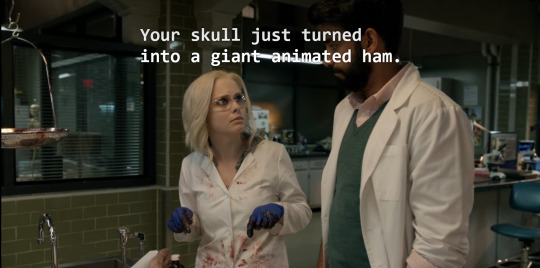
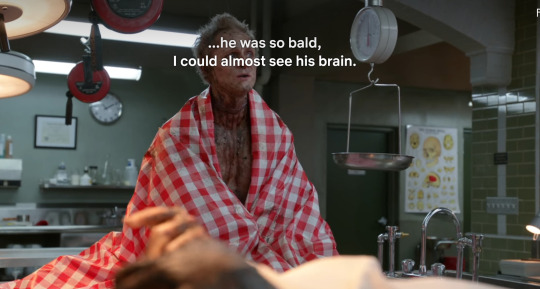
so there is something about human brains that they pick up on once they get hungry (and like...really hungry. They're always hungry, after all. Liv once compared herself to just a stomach and we've also seen humans devour more than just brains when they were in a particularly frenzy, for example in the prison bus scene)
But then you also have this:
And I find this interesting for a variety reasons, especially: It's not just that zombies find human brains appetising when they get hungry (although Liv and Blaine both comment on how disgusting they find brains and later you can see them eat them raw and unseasoned so maybe it's also something that takes a while to 'grow in'?). They also find zombie brains specifically un-appetising. So on normal hunger levels, zombies don't recognise each other - but Romeros can happily shamble around each other and ignore other zombies but go bonkers the moment a living human is in reach. that means that their ability to recognise other zombies also becomes stronger when they're being starved. And it's also interesting because of Major's and Blaine's zombie sense in season 2 - which proved that they would eventually turn back bc the zombie radar isn't a completely new feature they got with the cure, but it's something that is dormant in all zombies and just stayed active in them.
You also have the rat, which is acting on a much more feral level than your ordinary non-Romero zombies: Not only does it go after the brain of another species, which the human zombies don't, but it can still differentiate between Ravi and Liv as human and zombie respectively.
And it's interesting bc basically, the zombie virus has its own means of maintaining itself, even if it's not the result of selective evolution. (For example, rabies makes infected creatures shy away from water so that they don't wash down the virus load in their mouth when they drink - and can more effectively infect others. The plague virus keeps the fleas it infects permanently hungry and unable to feed themselves - that way, they will bite even more than they usually would and the disease spreads even faster).
Now, the zombie virus as we encounter it in the show just spreads from human to human (or zombie to human). In their normal state, zombies should be able to recognise human from zombie visually - but in their Romero state, they cannot. Because they're dumb like that. And it's interesting that (despite the zombie virus being an artificial virus) there is a mechanism for that: they become able to distinguish zombie from human the more feral and erratic they get. And this is useful because the only way to kill a zombie (destroy the brain) is ironically also their food basis - so if there was no mechanism that would allow Romeros to tell human from zombie, they'd just effectively wipe each other out by going for each other's brains. And I know it's an obvious writing thing, but taken at face value...I dunno, I find it pretty neat.
#I mean if we think of it as a means of advancing the spread of the virus#then you could even argue that turning the host Romero is always the endgoal#the virus doesn't kill the host after all - in a way the human personality just withers away same as the flesh#until it's just the virus operating the body like a puppeteer#izombie#fandom#this doesn't even have a point. really im just obsessed with Liv's deranged cackle when Ravi says the rat will cause the apocalypse
23 notes
·
View notes
Note
hey, it's been a while since i've last submitted a question here, hope you've been doing great, but i've kinda been wondering to myself just now, how does Holly's eyes work? since the more i think about it, i wonder if they have some sort of optic inside their shell, or if the void inside their body magically gives them eyesight, idk seems like a weird question, but as someone whos been kinda fascinated trying to speculate about vessel anatomy both in cannon and headcannon, i would be curios to see what others would think.
Hi there! Thank you, I hope you've been doing good as well!
The way I imagine it, their eye sockets aren't necessarily empty. Well, they sort of are - they don't have eyeballs, so I imagine the void gives them the ability to see. How exactly it works I'm not sure, but considering the void seems aware of its surroundings to the point of lashing out if you get too close, perhaps focusing that into an eye like structure would allow them to properly see its environment.
In the past I toyed with the idea of Holly being colorblind, either because of the void itself, or due to the infection damage. But these days I tend to lean more into them seeing colors but in a very washed out way. They can recognize blue from green or orange, but they would have trouble distinguishing between individual shades of those colors. And I do think that's directly related to how their eyesight works - they don't have an actual eyeball structure, so I think it makes sense that it wouldn't be perfect, the Abyss isn't exactly the most vibrant, so good color vision wouldn't be a priority for any void being.
As for how their eye is structured - like I said, it's not exactly an empty socket. They have a membrane covering it that keeps the void inside their skull/mask.
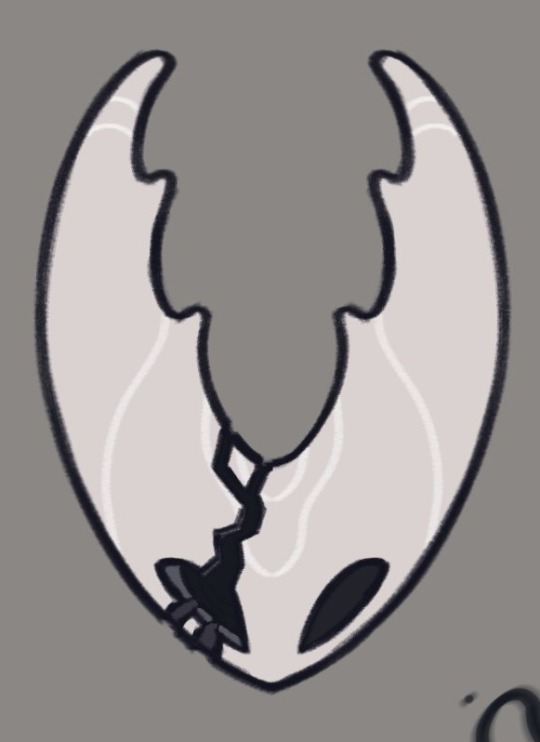
You can see it here compared to their cracked eye where the membrane was torn.
The membrane itself is semi-transparent. In its normal state it appears opaque, but if a bright light shines through it (say, for example, the blazing infection substance growing inside their head) then it becomes more noticeably translucent. It also doesn't reflect any light, so you'll never see them with light reflections similar to what you see on FPK or Hornet - the eye looks nearly pitch black 99% of the time thanks to the void underneath.
Aside from keeping the void inside, it also doubles as a focusing point for their eye structure, like a kind of lens, which is why they are completely blind in their right eye, since the membrane there is gone. That's not to say you could easily pop it with your finger. It's a relatively sturdy structure, and as long as the damage isn't severe, it can also heal and regenerate. But if it's completely destroyed, then unfortunately it's not fixable.
Another detail about the membrane - it's similar to their outer body shell in that it allows for controlled use of void tendrils. For instance, their missing arm has permanent shell damage, which means that the void there is unstable and can lash out at the environment unpredictably (and that is why it's covered by bandages, to keep it within their body). However, the shell on rest of the body can form into more stable void, used to hold and touch things, grab and consume food or to vibrate and make subtle noises. The eye membrane works in a very similar way, and as you can guess, their right eye lacks that function (that is where the eyepatch comes into play). Basically how I imagine it, the shell can "melt" into void and then harden again at will.
All of this also means that you can't actually take off their "mask". While it appears more hollow than the faces of non-void creatures, it is still directly connected to the rest of their body and many of its functions depend on that connection. Their sight being the primary one. that said, since the head itself is not made of void, it still becomes the "corpse" in an event of death.
I hope this was a satisfying answer. I like thinking about the biology of these characters, it's fun putting together the puzzle pieces left by the canon into a more complete image. Or, in the case of FPK and Grimm especially, making stuff up and turning them into weird synapsid/reptilian things that pretend to be bugs hahaha
22 notes
·
View notes
Text
Insult to Injury: The Director's Cut — Chapter 04 [Revised]
IV: MA JEUNESSE EST RESTÉE LÀ
AU DÉTOUR DE CE CHEMIN
The first time Madeleine discovered her father’s Beretta 92S she was looking around for the bleach. Like everything else in the kitchen cabinet, the gun had a use, and was not to be tampered with. With no one around to chastise her, Madeleine cradled it in unpractised hands, careful to keep her fingers off the trigger.
When the adolescent thrill of bending the rules faded into disillusionment, she was still on the kitchen floor, and maman was snoring in the living room. Madeleine simply put the gun back.
⁂
December, 1995.
The last time Madeleine lived under the same roof as her father, they were flying back to Austria from Morocco. Growing up, she’d hear that old adage, how children should be seen and not heard—that was Frederich König. A presence felt, rather than observed. Calling him papa up ’til a few years ago, this stranger standing arm-in-arm with her mother in weathered family photos. To the men from his protective detail, and the associates distinguishable by the cut of their suits and bottomless apathy, he was just Mr. White.
Back home in Altaussee, she walked up the stairs, through the front door after her father. The house was quiet. Her father told her, “I have to make some calls. Go upstairs and get unpacked.”
Madeleine’s room, on the second storey, looked out over the lake and the surrounding roads Puchen and Fischerndorferstraße. In the winters, she’d stand right next to the glass and see how long she could tolerate it without shivering. Thanks to the generator, the house never froze over.
Her father’s voice drifted from the floor below, migrating from kitchen to hall to living room. Madeleine caught the names Ziffer and Blofeld, and the phrase éminence grise. A heavier door opened, closed. His voice faded, though he couldn’t have left through the back.
Madeleine crept downstairs to investigate. Her father’s coat hung up in the closet. He wasn’t in the living room or the kitchen. There was a door between the two rooms which she and maman never touched, because it was always locked.
Madeleine put her ear against it. It was too thick to hear anything. She pulled away, frowning. The knob turned and Madeleine jumped back as Mr. White stepped into the kitchen.
“Maddie,” he said. “What are you doing down here?”
Madeleine admitted that she finished unpacking. Then asked, What were you doing in there?
“For the next month,” he said, “I’ll be working from home. So don’t make too much noise upstairs.”
Madeleine didn’t understand. You’re always away on business trips.
White chuckled. “That’s your mother talking. An associate of mine has agreed to take over in my absence. It won’t be permanent.” White considered her for a moment. Glancing at the kitchen sink, he said, “This was going to come up, sooner or later.” He opened the door with one arm. Madeleine stood on the peripheral between childhood home and the great unknown. Over his shoulder, he said, “No need to be shy. Just be careful on the stairs. There isn’t any handrail.”
Following him down a flight of steps, into the basement glowing under bare bulbs. A map of Morocco hung on the wall above a row of black storage cabinets, with several blankets folded neatly atop. Stacks of VHS tapes organised with a VCR. A pair of CRTs displaying a black-and-white image of the front and rear exits.
Madeleine’s attention drawn to the old oak desk in the left corner of the room. It looked heavy enough to break the staircase, and very beautiful. A flat plane gleamed obliquely on its surface.
She went over to get a better look. A framed photograph, reflecting the light. Ten soldiers in khaki uniform, standing against a hand-painted mural of an octopus engulfing a fighter jet. A message scrawled behind them, Les Spectres de Pierre, 1982.
Who is this?
Madeleine pointed to a face in the front row. The smallest of the group, with piercing eyes and a thin smile. His blonde hair, a little fuller on his scalp, was cut short.
“Mr. Blofeld and I were in the same division,” said White after a pause. “It was a long time ago.”
Gesturing her over to a stainless metal bench, along the opposite wall. There was the Beretta 92S. Running through the basics: this button at the bottom of the grip released the magazine; slide-mounted safety that also functioned as a decocker.
“Ideally,” said White, “you want to keep a round chambered and the safety off. The first pull will be a little stiff, but in a realistic scenario it won’t impede you.”
His gnarled hands passed the gun into her own. While Madeleine lacked the muscle memory of a soldier in the French Foreign Legion, his approval was a powerful motivator.
Each day, the two of them spent an hour or two in his office after school. Once she was comfortable with the gun he took her outside, setting up targets. “Shot placement is crucial. Go for the vitals. The lungs or the heart. The head, only if you are certain you won’t miss. At the end of a string of fire, always decock and then move the safety back up.”
Once she was able to consistently get chest-shots, her father introduced her to the concept of a ballistic vest.
“At close range,” he said, loading the Beretta, “it’ll knock you off your feet.”
Madeleine instinctively squared her shoulders. She’d seen what that gun could do to a target.
Does it hurt?
White paused. “Oh, you might have a bruise. Nothing too bad.” Taking aim while Madeleine fought against the muscles in her face, not to cower. The way he described it sounded no worse than a needle. He fired one round exactly into the centre of her chest; Madeleine went sailing backwards through the air, skidding in the snow which cushioned her fall.
“How do you feel?” he called.
Madeleine blinked a couple times to clear her vision. Pushing herself to stand, brushing the snow off her clothes. Unzipping her coat, running her fingers along the dent left by the bullet, she said in a slightly halting voice, My jeans are wet.
Her dad chuckled. “Not so bad, eh?”
Madeleine’s mouth curled into a wavering smile.
“That vest is what we call soft armour. It’ll stop a handgun bullet and protect you from fragmentation. If someone comes at you with a rifle, you should be wearing hard armour. Even then, by the time someone is pointing a gun at you, it’s better to shoot first.”
He caught her at the perfect time. Before this burgeoning curiosity about his job curdled into abhorrence. Ten years old, tough enough to get back up without sniffling. Interpreting compassion as the Kevlar vest around her torso, rather than the gun itself.
⁂
One morning, Madeleine came downstairs to find her father pacing from room to room. Talking agitatedly to someone named Herr Ziffer. Madeleine had to leave for school with the guard. Coming home that afternoon, her father was in the living room. Stacks of paper, where her mother usually took up residence. Briefcase placed at his feet. Wearing his suit and overcoat indoors.
“Hello, Maddie. How was your day at school?”
Madeleine told him the usual. Her father’s greatest concern was that she keep up with her studies. She said, How was your day?
“Busy as usual.” His tone was a little off. Attempting levity without any credence. “They’ve called me back into work. Your mother is well enough to come home.”
Is it because of mom?
White shook his head. “It has nothing to do with either of you.” Turning around, giving her his undivided attention. “If there is any trouble while I am gone, you know where the gun is and which number to call. You are to tell no one about the basement, or the gun, not even your mother. Do we understand each other?”
Yes, papa.
⁂
After thirty days of counselling, Maman could walk around by herself. Usually, she just sat in the living room, huddled under blankets, nursing a glass of mineral water. Or a cigarette. She was supposed to give up smoking as well as alcohol, but her husband couldn’t force her to comply with the doctor when he was on a business commute. She still had a terrible cough.
Sobriety opened up her personality in other ways.
Five days into January, Madeleine came home to find her curled up on the kitchen floor, weeping about her husband. Trail of blood from the clenched fist on her knee. The bread knife and conspicuous loaf of bread scattered at her feet. When Madeleine tried to touch her, her mother shoved her away and said she didn’t need any damn help.
Madeleine sat with her anyway. Convincing her that it was okay to bind her hand, helping her to stand. Walking her to the living room, to sit by the window. Before she could go and clean up, her mother pulled her into an embrace, kissing the top of her head. All she whispered was, “Thank you.”
Madeleine said nothing. Pulling away from her mother with a strange ache in her chest. In the kitchen, wiping down the bloodstains and discarding the bread, she could hear maman humming La petite maison bleue. Creeping upstairs, she shut the door to her bedroom before smothering the inevitable loss of composure into her pillow.
On a better day, Madeleine would eat breakfast to the sounds of Ella Fitzgerald, Françoise Hardy, Charles Aznavour. This morning, she did not have school, so she had no excuse to avoid sitting with her frail mother, collecting dust in an isolated cabin.
“It’s already been an hour,” her mother said with a scoff. “This is unacceptable. I’ll have to talk with your father about these thugs he hires.”
Madeleine glanced out the window. The sky outside brilliant blue.
Maman.
“Hm?”
You want me to put on a record?
“Pars?” Madeleine got up. As she was putting the record on, her mother said, “How was Tangier?”
They never discussed her father’s business or his friends, if it could be helped. Especially when he wasn’t around.
Madeleine told her a little about the dinner, in Morocco. Faceless men in well-tailored suits. Mr. Le Chiffre, who was friends with her father. And Ernst.
“Mr. Blofeld. Don’t be rude.”
Yes, sorry.
“That bastard. He’s been waiting to get his claws in you since your father signed the prenup.” Madeleine averted her eyes. “I told your father he wasn’t allowed to bring his Legion friends around here anymore. This is his idea of a solution.” Her mother was nearly out of mineral water. When Madeleine walked over to check if a refill was in order, her mother said, “Just promise me you won’t get yourself involved with men like Blofeld.”
Okay.
Her mother’s face contorted. She grabbed Madeleine’s hand in her cool ones.
“You don’t know what he’s capable of. For your own sake, I need you to promise me.”
Yes, said Madeleine, not sure what she was agreeing to, I promise.
Her mother let go. Madeleine had an excuse to put on the B-side; La Bambola, and Dans La Ville Endormie. But she said,
Mom?
“Yes, dear?”
What’s an éminence grise?
Her mother leant forward. “Where did you hear that term?”
I just read about it somewhere.
Glancing out the window with a scoff, shake of the head, her mother said, “An éminence grise is someone who exercises power or influence without holding an official position of authority. Imagine a person who never shows his face in public. This person relies on other men to do his bidding. So, if something goes wrong, they will take the blame instead.”
Is my father an éminence grise?
Her mother raised the glass of mineral water to her lips. “He definitely works for one.”
Veering into the kitchen on the pretense of taking her mother’s glass to the sink, she stopped by the closet to put on her old pastel coat, fuzzy grey boots. Ignoring the dirty dishes on the counter, she opened the cabinet. Took the Beretta 92S from its holster, shoving it in her coat pocket.
Her mother asked where she was off to in such a hurry.
Madeleine told her that it was a nice day out. Seemed a shame to stay in here all morning. When she passed by the living room again her mother had averted her eyes to the dying cigarette in its ashtray. Madeleine added if she would like to join her outside, that was okay.
Her mother looked up. At the same moment there was a harsh knocking at the front door. The gun weighed against Madeleine’s hip, despite adjusting her stance. Her mother said, “That must be your goon. Get the door, would you? I don’t want him in the house.”
The man on the other side of the door wore a white parka, snow pants. Porcelain mask betrayed no humanity beyond the glittering eyes beneath. He tilted his head down at her and asked, “Vy Blanshar?”
Madeleine was looking at the rifle slung over his shoulder. The bodyguards all referred to their employer as The Pale King. Sorry, Madeleine said in French, you must have the wrong address. She went to close the door. He stopped her with his arm, one gloved hand resting on the jamb. Madeleine, light-headed, had to crane her neck to look him in the eyes.
Her mother called, “Shut the damn door. It’s the middle of January.”
The man’s head lifted in the direction of her voice. “Chto ona skazala?”
At school, a classmate once told her he could understand Russian partially, on account of his fluency in Polish. He was the only kid to admit to knowing Russian in such a capacity. Madeleine’s conception of Russia limited to the dissolution of the USSR, when she was five years old. A few terms on the news and in the newspapers, like glasnost and perestroika. All of it so far away. Abstract to a child who grew up without want of food, or safety.
“Blanshar,” the man reiterated, in accented English. “She is here? You know her?”
The only way to get into her father’s office was the key he carried on him. Madeleine had a very small chance to deceive this man, playing mute. With a mask, his visibility was limited. All she had to do was reach into her coat and take aim.
Rather than ask twice, he simply forced his way over the threshold. The back of his head in line of sight. Madeleine couldn’t move. Not as he turned the corner into the living room, out of sight. Not as he asked in that same, accented English, “Are you Blanshar?”
“What the hell are you doing in my house?” her mother snapped, “I can hardly understand you with that mask.”
“A message, from Adelheid.”
A wheezing, repetitive shudder; her mother’s laughter. In French she hissed, “Ernst, you son of a bitch,” switching back to English, “all right, what is this about? Money? Favours? We do more than enough for that family.”
“Your husband forgets his obligations. You will make sure he gets the message.”
Cowering against the wall, Madeleine stuck out like a bullseye in her winter coat. Shoving one hand into her coat pocket and clutching the Beretta 92S so tightly her fingers hurt.
Her mother was saying, “If you are the best Adelheid can afford, I pity her. Someone must really abhor you. I’m sure you feel very confident, under your mask. So, when I’m finished talking, you’re going to turn around, walk out the way you came in. Explain to Ms. Adelheid, or her contact, that my husband is not here, and I’ve no idea where he is. He doesn’t tell me a goddamn thing about his SPECTRE friends or the trouble he is in. Tell Adelheid I will pass along this message of yours whenever he deigns to come home. Now get the hell out of my sight.”
Two shots overpowered Madeleine’s scream. With the blood roaring in her ears, she wasn’t thinking about ballistics or shot placement. Ten years old. Choking back her breath in one fist to stop from hyperventilating.
Gunman came into view as did the shine of dark red on hardwood, the soles of his boots. The rifle around his shoulder, at ease.
Just like that, Madeleine was not a child anymore.
She drew the gun, aiming between the eyes. His whole body tensed up, an animal about to spring. Turning himself away, at an angle where the bullet wouldn’t penetrate his skull. The first shot grazed his the jaw—shattered the mask, drawing blood.
Madeleine emptied the magazine into his chest.
⁂
The colour of the sky was fading into crimson when Primo confirmed her father’s arrival in Zürich. He would be at the penthouse in a matter of minutes.
Madeleine took up a seat at the living room, where she had line-of-sight of the entrance hall.
Mr. White was a businessman first. When all was said and done, only her surface-level concerns would be addressed. It was better to settle for whatever answer she got, because he’d happily keep her waiting the rest of her life if she allowed him the opportunity. Approach him, not as her father, but a business partner who wanted to cut her a deal.
The front door opened. Her father’s voice drifting in. Despite living in a variety of different countries during her lifetime, he had never been able to leave behind his Austrian accent.
Coming into view, he’d dressed for the weather in a sharp grey coat and matching homburg hat. As he moved up the hall into the living room, his gait was a little slower. His cheeks sunken. Greyer around the temples. Through all these years spent running from his shadow, on his dime, she’d never stopped to notice. “Hello, Madeleine.”
Right out of the past, and back into her life. “Hello.”
Mr. White did not remove his hat. His eyes lingered on her face. Safin motioned to Primo, who went out. White said, “You’ve grown out your hair. It looks lovely.”
“Will you be staying?” Madeleine asked, focused on her father.
“I’m afraid I can’t for very long, I’ve got a meeting in Rome, tomorrow.” The words and tone of voice didn’t match his expression. Body language closed-off, eying her critically. Less the concerned parent and more a discerning realtor. Madeleine said nothing. Mr. White’s mouth thinned. “You must understand, Madeleine I’ve done everything in my power to let you live as you wish. And you have been exceptionally self-sufficient, always. But there are exceptions to any rule, and given your situation—”
“—are you going to tell me why?” Mr. White paused. His frown set the lines in his face into sharp relief. Madeleine levelled her tone: “I’ve been uprooted from my previous life without advance notice. Explain it to me, what could possibly be the issue? Is it my finances? Poor choice in men?”
Safin averted his attention down the hall, towards his associate. White glanced at him, back to Madeleine. Scowling. “Don’t tell me you’re still seeing that—what the hell was his name, Olivier?”
Madeleine gave a little jerk of the head. “Arnaud. The one from Oxford.”
“Oh, of course,” said Mr. White. “And, how is Arnaud?”
“He threw himself out the window.” She glanced coolly at Safin. “That little stunt in Paris, was it meant to frighten me off as well?”
“What the hell is this about?” asked White sharply, to Safin.
Safin didn’t miss a beat. “An attack, meant for her.” Giving her a look that said, don’t test your luck. “We intercepted.”
Madeleine would not be ignored. “Maybe you can tell me who was behind the insurrection in Conakry?”
“Dr. Swann,” said Safin tersely.
“It’s got to do with Conakry,” said Mr. White slowly, “but you were smart enough to keep your nose clean. Your connections to me have attracted some… let’s say, unwanted attention. Right now, it’s in your best interest to lay low. I’ve sent your credentials to a private clinic in Norway, and they are keen to interview you as soon as you’re available. It will be a higher-end establishment, but you know how to conduct yourself. They specialise in forensic psychiatry. One of your interests in university, if I recall correctly?”
“You’ve been spying on me that long?”
White ignored this. “You’ll find that once you get into the right clinics, no one is going to bother you.”
“I don’t need to hear your excuses,” Madeleine said coldly. “For once in your life, at least, tell me the truth.”
White chuckled. “You think you can sit across this table and dissect me, as if I am one of your clients? That doctorate is just a piece of paper. All it tells me is that you know how to recite from a textbook. You do not understand what I have sacrificed to keep you safe.” White looked around the room, out the window. The sunset in the glass, over the ocean. He sighed. “I don’t fault you, for however you may feel. I could have interrupted your studies. I could have pushed you into taking over the family business, in spite of your interests, and watched you grow up into the spitting image of your mother. Would you have preferred that?”
Madeleine studied her hands. “I still dream about that house in Altaussee, you know? When you finally got back, it was sunset. I had been waiting for hours. I got frostbite, because I was so afraid to go back inside.”
White shrugged. “You still feel guilty? Buy Droit a nice bouquet this Christmas.”
“I understand what you are willing to sacrifice. Perhaps I’m just another failed investment. But that’s no major loss, is it?” The look of shock on his face was almost worth the unretractable line. Madeleine looked into the old grey face. She was so tired of running. She exhaled, slowly. “I hope you will excuse my tone, papa. It’s been a very hectic week, without answers. I understand this is for my protection. And, I will not refuse your generosity.”
Mr. White blinked several times, then forced a smile. “Of course.” A man who had always been apathetic, unshakeable, showing the first signs of age. “Well, if that’s all settled, I’ll be on my way.”
Madeleine stared at his retreating figure. When the door shut behind him her eyes lingered on the empty space his body had occupied. She stood up. “What do you think you’re doing?” said Safin.
Madeleine turned. “With all due respect, it doesn’t involve you.” Too tired to argue with any conviction but unable to settle her emotions properly. “It’s not as if I’m going to change his mind on this. God knows, my mother tried. But it’s all the same trivial matter to you, isn’t it?”
Safin went very still. Six days did not leave a lot of room for prolonged familiarity, but the expression on his face engendered an immediate sense of regret.
“I forget,” he began, in a voice that came from a dead throat, “how ignorant you are of your situation. I will explain, this one time. Your family spat, and what you believe you witnessed a week ago, are of no importance in the big picture. If you value your life, you will take me at my word.”
Madeleine’s eyes drifted to the window and the empty horizon. Trapped in her contempt, unwilling to back down for the sake of pride. Safin wasn’t her father, or Arnaud, or anyone else that could be bartered with. She did the next best thing and checked the larder in the kitchen. Fetched the bottle of liquor that had not been touched. Opening cabinets, setting the glass on the counter with unnecessary force, pouring a shot. Downed it like medicine, coughing. Her nose burned. Glancing at Safin through a grimace, she said, “You think you’ve got me all figured out, don’t you? Just another trust-fund baby with daddy issues.”
The smile was very slight, but it touched his eyes. Amber eyes.
Madeleine averted her gaze to the bottle on the counter with uncharacteristic interest. “How much do you suppose I could drink before I pass out?”
“Assuming your tolerance, it won’t kill you. You might wish it had.”
“Please,” said Madeleine with an imprecise wave of the hand, “don’t pretend as if you care.”
The expression on Safin’s face would suggest he was, at best, affronted. “You speak this way to all of your CPOs?”
“Oh, yes. You’ve been assigned to babysit me. Did my father select you personably?” Safin threw her a very odd look. “Personably? No, that’s—personable. Merde. Personably.” She ambled to the kitchen table with a slight waver and took a seat. She scoffed. “Don’t look at me like that.”
“Like what?”
“You pity me.” He kept her in his peripherals. “That’s your problem, you know? You want me to think you don’t give a damn, but you stare too much.” He was definitely studying her. Just to make sure this wasn’t some kind of half-assed attempt at a come-on. Some phony mental exercise. Trailing off for a second with renewed fascination, she added, “You have beautiful eyes.” Safin blinked slowly. “Ah, I guess that was a little forward. Has anyone told you?”
“You’re intoxicated,” he muttered, with a slight scowl.
Madeleine didn’t need a doctorate to tell you that keeping a man’s attention was no different anywhere. An unfixable melancholy in her eyes and smile. The humanitarian angle never got her any points, but it looked good on a resume.
“I don’t usually do this, sorry. I must be causing you a lot of trouble.” Interpreting his silence as a grant to continue. “Can I tell you a secret? I don’t believe I have ever been in love. I don’t even know how to lie about it. If you put a gun to my head I don’t know what I’d do. Does that make sense?”
“Dr. Swann.”
“Don’t be so formal, you’ve already called me Madeleine.” A flood of warmth stirred within her breast, separate from the buzz of intoxication. Admitting her feelings in such a casual, vulnerable way. The esurient flaw of the lonesome. “People must tell you all sorts of things. Do you just learn to tune it out, or—” Safin came over and took her by the arm about as graciously as when he’d steered her into the Jeep “—pour l’amour de Dieu,” she grumbled, brushing him away, “I’m tipsy, that’s all. Give me a minute.”
He obliged. Madeleine glanced down at her hands. Seeking closure from a man whose job it was to remain impartial. Maybe trust was a bridge too far.
“Do you drink tea, Dr. Swann?”
Madeleine blinked. Safin was on the other side of the room, opening and closing cupboards, retrieving a porcelain tea set and kettle. A dark silhouette against warm light, filling the kettle with water at the refrigerator tap. Moving over to the stove, clicking on the burner.
“When I used to live with my mother’s sister. She made a lot of black tea. I remember that it was awfully bitter but I didn’t mind at the time. It might have been Earl Grey.”
“Did she squeeze the sachet?”
Madeleine looked up sharply. “How did you know?”
“It shouldn’t be overly bitter. But a lot of people never learn how to make tea properly.” He indicated the tin to his right. “Any preference?”
“Decaffeinated. It’s getting late.” Madeleine got up. Hiss of the boiling water put her in a soporific trance that could just as easily be attributed to the liquor. She lingered by the counter until her arm bumped his. He glanced over. Not accusatory, assessing.
“It won’t be as strong,” he said. “The temperature should be in the range of 71-100°C, depends on the kind of tea. Red tea, or black tea to you, it brews at 100°C. But only at sea level. This matters more with delicate brews. Even a commercial brand—” he gestured “—is workable if you know what to do.” Transferring the boiling water from kettle to teapot, placing a sachet into the empty teacup, he poured the boiling water directly onto it. “Should be five minutes. Any longer, and it will be too bitter.” He paused. “I’m not boring you?”
“No. You don’t exactly come off as the type to offer anyone tea.”
His mouth twitched. “Primo would get along with you.”
Madeleine smiled back. “What kind of name is it? Safin,” she clarified.
“My mother told me it was Turkish, pronounced it Şahin. My brother said it was Arabic.” His shoulders lifted. “There are many different Safins in the world. Could just be misspelled.”
Four minutes later, he removed the sachets. She took the cup, scorching against her palms. Rather than sitting at the table she stood at the counter. “So, you’re seeing me to Norway?”
“That’s correct.”
Staring into her cup. “I didn’t really mind, leaving Paris. The rent was tolerable. I couldn’t stand working at that clinic. Everyone wanted to be friends. What I would do, to have problems like that. I used to daydream about it when I was a little girl. Whatever normal people did with their lives.” Madeleine shook her head. “Look at this. I’m actually talking to you about my life.”
“You’re not special. Just another bleeding heart with too much money.”
Madeleine chuckled. Grief stuck around in her stomach like a tangible weight. The liquor, just a counter to stoicism. “At least you’re honest.”
“You mistake self-preservation for altruism. It is not your job to be the world’s saviour. There are those that will die in your stead, not because you are weak but because life can be very cruel. It’s impossible to protect everyone you love, no matter how much it pains you.” He paused. “As far as charities go, there are worse ones than Médecins Sans Frontiers.”
“I’m so glad you approve,” Madeleine drawled. “Why don’t you explain this to me, I’m absolutely fascinated.”
He paused. “They are dependent, most often, upon the goodwill of donations. If an overwhelming crisis were to occur, cast them in an unfavourable light, it would be simple enough to take over. Once you are in control of operations, whatever you wish. Circumvent the money’s destination. Blame it on terrorism.” He glanced over. “The problem isn’t altruism. That’s good for business. It is everything else that gets in the way of honest men.”
She frowned. “You’ve thought about this very deeply.”
Safin shrugged. “It’s relative to what you’re trying to accomplish. You see enough suffering in the world. You are willing to face it. I can respect that.” Something almost imperceptible in his expression. Could have been a trick of the light. “Who taught you how to shoot?”
“My father. We had men on-post, around the house.” She took a sip of tea. “There was one time, they were unusually late. My father was away on a business trip. His gun was in the kitchen cabinet under the sink, and maman didn’t know how to use it. There was a knock at the door. She guessed it was the bodyguard. He was wearing this mask you might see in a museum.” Another sip. “Anyone with half-a-brain could tell you he was not there to take me to school. He kept asking for Blanshar, which was maman’s surname.”
She shook her head, mouth dry.
“I thought I could keep him busy because I had my father’s gun in my coat. But he invited himself in. Said he was there on behalf of Adelheid, I’ve no idea who that could be. My father never mentioned anyone with that name. Maman was just sitting there, and I—” tears sprung to her eyes, unbidden. Blinking them away, she continued in a girl’s wispy register “—I wanted to kill him so badly I didn’t care about dying myself. That’s what I thought. I fired nine shots into his chest. He must’ve had a bulletproof vest, which I didn’t consider at the time. I just assumed he would kill me—but, he let me go. Not maman, of course. Only me.
“My father found me outside that same evening. He put me into boarding school so I would have an excuse to miss the funeral. I remember hearing that he paid a lot of money for a closed-casket, which I never understood. There was no body to speak of. He moved back to Nittedal that same year, because there was a gas leak,” she scoffed, “if you catch my inference.”
“What happened to the gunman?”
“My father kept the old arrest records. Turns out it was this contract killer from the CIS—Vadim Durmaz. The police had his hotel reservations and the rifle he used. He was still injured when they found him.” She smiled. “Could you believe he was only seventeen? Anyway, it’s been about that many years, since it happened. I like to think he’s rotting underground somewhere.” She drank the rest of her tea. Safin was staring down into the tin. Madeleine said, “It’s not a very conclusive story.”
Still, he didn’t answer. Tension in his shoulders persistent. She got up to take her empty cup to the sink and he said, “My French was terrible.” Madeleine stopped in her tracks. “I spoke German well enough to get by at customs. Of course, my accent couldn’t be helped.”
Turning around as Madeleine took a step back and then another. Retreating until the backs of her legs hit the table. Shaking her head, whispering, “No. No, this isn’t—you are not making sense.”
“I didn’t know König had a daughter. My client told me where to go and who to shoot.” He gestured to a small scar just under his right ear. “If not for your hesitance, I would be dead as you say.” The expression on his face struck someplace in her gut. Like making eye-contact with a guard dog on the opposite side of a fence. “Later, I was told the authorities planted the physical evidence into the room of a different tourist at a different hotel, close-by. He’s likely the one who showed up in the arrest records.” Safin turned away first. “You shouldn’t worry about being targeted. You are smarter than your mother.”
“What the hell is this? Your idea of a confession? Were you hoping for my forgiveness? What, because you decided not to murder me that day? Because I’m smarter than someone who was so sick, she could barely walk around by herself?” A flicker in his expression, jarred out of indifference. Human vulnerability. She sneered with all the power she had left, “Don’t tell me you feel guilty.”
“It was a clean hit until you opened the door.” He didn’t have to raise his voice to make himself clear. Speech deliberate, tightly controlled, not for her sake. “I just didn’t want collateral.”
Madeleine’s laugh came out harsher. “Of course. Nothing is ever personal to men like you.” Safin turned around, but there was nothing to say that could acquit him. Her only weapon was contempt. “Don’t try and justify yourself. I don’t want to hear it.”
Retreating into the privacy of her room, the curtains were drawn. Suitcase laid on the centre of her bed. The door to the bathroom ajar as she’d left it. In the bathroom the light was on. Collapsing to sit on the edge of the bed, heart in her throat, she pushed her face into her palms.
Violent, wracking sobs without noise.
The first time unmasking this phantom through records, Madeleine was unprepared to find only a man. A face and identity assigned to her recollection. Human just like her, only seven years older. Perhaps with a family to mourn his loss. Her father speculated mob ties. Madeleine stared at the photo, trying to corroborate the two identities; Vadim Durmaz, L’homme masqué. Crossing paths only in dreams.
Once she lost the strength to cry, once the old burden around her heart subsided enough to breathe, only then did Madeleine rise from the bed. Stumbling into the bathroom to fix her face. Checking the suitcase to discover her new clothes already packed. She dug out the Glock 32, tucked between the folds of that morbid raincoat. Sitting at the end-table by her bed, ejecting the magazine. For old time’s sake.
She heard the gait coming. Could be Primo, coming to check if she was rational. Perfectly lucid. Just having a moment. Didn’t these men understand that jarring her out of such a fragile state could be detrimental? What did a couple of hired thugs know about empathy?
The knock at her door still made her hackles raise. “Dr. Swann.”
She said, “It’s unlocked.”
The knob did not turn. Madeleine got up. Opening her door to the same monster under a different alias, corroded by time and exposure. At this range, it would take one clean shot to the chest. An insurmountable burden lifted from her shoulders with the surprise flickering over his scarred face. Wine-red stain blooming across the dress shirt. Catching himself on the jamb, leaning against it. His breath wheezing, congealed. With a punctured lung he would have fifteen minutes. Less with the likelihood of internal damage, or the associate’s reaction time. Sliding to the floor, a trickle of blood from his mouth. Drowning from the inside. Primo would catch up, and that would be the end for the daughter of Frederich König.
Such a pity that her parents brought up a liar, not a killer. Hands balling to empty fists, nails into her palms, grounding her in this seventeen year-old nightmare. The heartless killer still had the courtesy to give her space. She whispered, “No one has ever told me what really happened to maman.” Her eyes prickled. Worrying her lip. The child’s anguish bleeding through cracks in her composure. “Tell me,” she said, gesticulating to the gun on the table, “why you would give this to me, after what you have explained?”
In one hand, he produced the box of 9mm Speer Gold Dot JHP ammo. “Protection.” His voice a little softer. She could be forgiven, for misinterpreting reassurance out of apathy. “That is the only reason, Dr. Swann.”
The way he looked through her, it made her whole body turn cold. Her greatest triumph was to lay in bed each night, whispering to no one, I could have stopped this. I could have.
Now, grasping at this inexorable truth, this exoneration from her mother’s slaughter, she almost asked him to stay. A preposterous notion with no acceptable conclusion. Her mother’s killer, sitting by the bedside, watching over her. Watching the door. As a child, there was never a hand to hold in the dark.
Safin said, “Your flight departs at at 07:40. We’ll leave an hour before then. Be ready.”
He closed the door softly. Madeleine took the Glock, placing it back exactly as she found it. Beyond the curtains, there was no one left to lie to but her reflection.
EDIT: 11/06/22: Cleaned up the ending dialogue and fixed formatting in html.
9 notes
·
View notes
Text
Digimon Data Squad Dub Comparison Episode 47 - The Data Squad’s Final Battle!
This is a companion to my commentary on the original Japanese Digimon Savers! Reading my commentary on the original version of this episode (which you can find here) is recommended before reading this dub comparison.
Original name ~ Dubbed name
Masaru Daimon ~ Marcus Damon
Yoshino Fujieda ~ Yoshino “Yoshi” Fujieda
Tohma H. Norstein ~ Thomas H. Norstein
Ikuto Noguchi ~ Keenan Crier
Yggdrasil ~ King Drasil
Professor Suguru Daimon ~ Doctor Spencer Damon
Craniummon ~ Craniamon
Chika Daimon ~ Kristy Damon
Kenji Noguchi ~ Kevin Crier
Omegamon ~ Omnimon
Dukemon ~ Gallantmon
Sleipmon ~ Kentaurosmon
[Since several characters share the same name between the original and the dub, quotes from the dub will always be in italics, while quotes from the original will not, in order to distinguish them.]
Wow, the very first thing I get to remind you of in this episode is Falcomon’s voice being the worst, because he has one of the earliest lines.
They cut some shots of city-destruction in the human world. They were fairly intense even by Savers’ usual standards of city-destruction, so I guess I can see why. Instead, the crystal missiles just hover ominously over the city, and then we cut away.
Yggdrasil: “I’ve told you. This is divine punishment. […] This is the sentence you deserve for challenging God. Now… atone for your sins with your deaths!”
~~~~~
King Drasil: “I told you. Your punishment is permanent deletion. […] This is what you get for trying to challenge a King. Now you shall pay for your arrogance!”
King Drasil’s threats are basically the same, but they do hit a little different when it doesn’t have that god-related angle to it. It feels slightly more just angry and less high-and-mighty.
Lalamon: “We’ll fight you, even if it means burning out our lives!”
~~~~~
Lalamon: “We’ll never give up! When we join together, we’re more powerful than you think!”
Lalamon in the dub is being a bit more generic shounen power-of-teamwork, instead of saying that she’s willing to die for this.
Rosemon’s neckline has been edited again, even though this decidedly isn’t one of the episodes in That art style.
Yggdrasil: “Fools.”
~~~~~
King Drasil: “Traitors.”
Yggdrasil presumably called them fools for thinking they could win. King Drasil seems to think they’re traitors, even though they were never on its side to begin with. I guess it just feels they’re traitors to Digimon?
As much as I like the evolution music, we again have the problem of it creating an upbeat and triumphant mood when they spend basically this entire fight losing.
Oh hey, it’s the Geo GreySword, for the final time.
Masaru: “You bastard… Stop looking down on us from up there! I’m… We’re still alive! As long as we’re clinging to life, we’ll keep striking you until you fall!”
~~~~~
Marcus: “Some king! You’re the one who better realise the extent of *our* power! We’re not done! And we’re gonna keep comin’ at you! Do you hear me?! No matter how many times you knock us down, we’re never gonna quit!”
Eh, this Masaru speech is pretty similar because it was fairly non-nuanced never-say-die stuff in the first place. Some loss of Masaru disliking the way Yggdrasil’s looking down on them, and a bit less of the idea that he’s insisting they still have a chance as long as they’re even so much as still alive, but the general spirit of it is hard to mess up.
Yggdrasil: “Just try it.”
~~~~~
King Drasil: “Whether you quit or not, you will be destroyed.”
Less amusingly trash-talky from King Drasil here. Possibly because this line and Marcus’s speech just before it have been separated by a commercial break, so it wouldn’t have been so clear what the original line was responding to.
Gotsumon: “D-Don’t! If you get hit with that again, everyone will absolutely, positively die!”
~~~~~
Gotsumon: “Please, no more! You can’t keep egging him on! If we get hit again, we’re done for!”
I don’t know why he’s warning Marcus not to egg King Drasil on when the implication is that King Drasil is about to kill them all anyway, but I suppose that was also the general sentiment behind Gotsumon’s warning in the original too, if not in so many words.
(Of course he can’t say “die”, but “done for” is decent enough.)
Masaru: “When you’re in a man’s fight, you’re already risking your life! The moment you get scared of dying…”
~~~~~
Marcus: “If you’re afraid, then go hide. I’m staying right here! We have to be willing to risk our li—”
So, in the original, this was Masaru quoting something he said back in episode 1. That line in episode 1 was different in the dub, so they can’t call back to it here. I also just don’t think the dub even realised that this was a callback nor understood what this philosophy of Masaru’s actually meant – on the surface, this seems like the dubbers might consider it a fairly direct translation of the intent. But it’s not.
Masaru’s speech was about how you’re always at risk in a fight, but you have to choose to push that risk aside and ignore it in order to stand the best chance of winning. It was him essentially not wanting to think about the risk to his life, at least at first, until he remembered his dad’s sacrifice. In the dub, because he is instead being fully willing to risk his life already, remembering his dad’s sacrifice doesn’t actually change anything about how he feels about this.
[flashback; last episode]
Suguru: “There will come a time in a man’s life when he must accomplish something at the risk of his life. Now is that time.”
~~~~~
Spencer: “Comes a time… when a man must risk his life to keep a promise he made to his friends. Now’s that time.”
Spencer’s added bit about keeping a promise to his friends didn’t make sense in its original episode 46 context, and it still doesn’t particularly make sense in this context here, either.
Marcus: “This isn’t a schoolyard fight any more! This is a fight to protect everyone! That’s what you taught… right, Dad?”
This line’s mostly the same as the original, but it implies, like the original did, that Marcus is having a sudden change in perspective thanks to remembering his dad’s sacrifice. Only I already talked about how he kind of isn’t, based on his previous line.
The only new part to this line in the dub is “that’s what you taught”, which is a little odd, because I don’t think Spencer was specifically thinking about teaching his son to see things as more serious than just schoolyard fights while he was busy sacrificing his life.
Yoshino: “That’s right! We won’t lose!”
Ikuto: “We have to win this fight no matter what! That’s why…!”
Tohma: “We can’t die!”
Masaru: “Yeah! We’ll definitely win!”
~~~~~
Yoshi: “That’s right. Marcus… we’ve got your back.”
Keenan: “Yes, me too! We with you all the way, to the end!”
Thomas: “If we go down, we go down together as a team!”
Marcus: “Hear that?! We’re fighting as one!”
Aww, I like the dub lines more here; less individual generic fighting talk and more supportive friendship!
With the much more lukewarm opinion on humans that reborn-Gotsumon has generally had in the dub, it’s a little more surprising that he’s so desperate not to be left behind than it is in the original.
Garudamon, naturally, also has a Stock Growly Evolved Digimon Voice that makes him sound like significantly less of a character in that form.
Yggdrasil: “But your life will not be in vain. Stand there and watch as I erase the human world.”
~~~~~
King Drasil: “Your efforts will have been in vain. Stand there and watch, as I now destroy the human world.”
King Drasil’s flipped-around version of this sentiment seems to make more sense on an obvious surface level – Craniamon’s efforts to protect the worlds will be in vain if the human world is destroyed anyway. But I liked what framing things the opposite way told us about Yggdrasil: that it’s so self-centred it literally can’t see Craniamon’s betrayal and sacrifice as anything but an inconvenience for itself and its own goals, and so it’s telling itself that miscalculation won’t make its own plans in vain.
Some more city destruction gets cut here, too.
Chika: “How could you do that?!”
Yggdrasil: “Can’t you tell? This is purification!”
~~~~~
Kristy: “How could you do that?”
King Drasil: “All Digimon who attack their King are traitors! If the Digimon had an ounce of loyalty in them, they would be helping me instead of fighting me!”
Though Chika was asking why Yggdrasil attacked Garudamon/Piyomon, Yggdrasil’s answer seems to completely sidestep that topic and talk about “purification” of humans from the world in general – as if that’s obvious and it can’t get why Chika couldn’t understand that. King Drasil, on the other hand, responds a bit more normally about considering rogue Digimon to be traitors. It still has that huge sense of entitlement to loyalty from every single Digimon just because it’s King, even though most Digimon don’t even know for sure it exists, which is fitting for it.
Yggdrasil: “Therefore, I shall reduce everything in this world to ashes. To save the Digital World!”
~~~~~
King Drasil: “My duty is to protect the Digimon, so in order to save the Digital World, I must destroy the human world.”
The rest of King Drasil’s speech here, once it’s done talking about Digimon disloyalty, gets back to the same point Yggdrasil was making in the original about how this disaster is all the evil humans’ fault, yada yada, therefore. The only difference to that part is that King Drasil mentions it has a duty to protect Digimon, which I can buy as in-character for it only if it doesn’t really mean it and is using that as an excuse.
Masaru: “I won’t let you hurt anyone else! We will protect this world!”
~~~~~
Marcus: “Thought you could just run off, huh? I told you, we’re not goin’ away!”
Marcus’s lines make sense given that they just chased King Drasil here, but I do like his protective angle in the original, having just barely stopped Yggdrasil from killing his sister.
Wow, you can really tell they cut a bunch of fanservice shots out of Rosemon Burst Mode’s evolution animation when it’s inexplicably by far the shortest and least-flashy out of any of them.
Yggdrasil: “The degree of your power was impressive. But even that is impotent against a God!”
Tohma: “He can self-regenerate?!”
Yggdrasil: “Certainly. Death does not exist for a God. Not only do I have everlasting life, but I can be resurrected at any time.”
~~~~~
King Drasil: “I’m quite impressed by the level of power you possess. But it’s no match for the King of the Digital World.”
Thomas: “He can regenerate!”
King Drasil: “Of course. I am eternal. The thought of you or anyone else destroying me is preposterous.”
Yggdrasil having regenerating powers and being literally impossible to kill makes plenty of sense when it’s a god. It’s a lot more of a stretch to buy that King Drasil being simply a king makes it somehow able to do that. It comes across more like its insistence that nobody else could possibly destroy it is just posturing, and it might actually be possible if they manage to overwhelm its regeneration powers.
Man, they really do have a lot of city-destruction to cut in this episode. I wonder where they’re editing stuff in to fill out episode time in its place. Probably just by making a few lines over relatively still shots last longer here and there; that seems to be one of their go-to tricks for that.
Masaru: “You bastard… You hurt my follower! I won’t forgive you! I’m bringing you down!”
~~~~~
Marcus: “That’s it…! You… You can try doin’ anything you want to me… But when you mess with my friends… it’s fightin’ time!”
So, the “you hurt my follower” here – or, more specifically phrased in Japanese, “how dare you hurt my follower” – was a callback to what Masaru said to the Cockatrimon in episode 1, spurring his first Digisoul punch. That line in episode 1 was changed in the dub, and instead it was his very first “it’s fightin’ time!”. Fitting, I suppose, that he’s also saying that here, but it’s never going to feel like a specific callback when he says that all the time.
It's also a little odd that he’s implying it’s only fightin’ time when someone messes with his friends. Come on, Marcus, you know full well it’s been fightin’ time for plenty more reasons than just that.
Yggdrasil: “Anger… Hatred… Don’t forget that countless Digimon harbour those same feelings.”
~~~~~
King Drasil: “I understand what you’re feeling. Anger… Hatred… Now you know the emotions that many Digimon feel towards humans.”
Does King Drasil really understand those emotions itself? I highly doubt it, and I hope the intent here is that it’s just saying that to be manipulative. There’s also something about the way it seems to think that only now would Marcus know how plenty of Digimon feel towards humans, now that he’s feeling similar emotions himself, as if he couldn’t just understand and empathise anyway. Maybe that says something kinda neat about King Drasil’s difficulty with empathising? Not convinced it’s deliberate, but.
Masaru: “What?”
~~~~~
Marcus: “They what?!”
Meanwhile, the dub totally screwed it up with Marcus’s reaction, what the heck. Masaru’s was just a caught-off-guard “wait, what, you’re suddenly making it about this now, okay then???” But Marcus is protesting, like he thinks that Digimon feeling anger and hatred towards humans after everything that happened is nonsense. What the hell, Marcus, come on, of course that’s understandable, you of all people should know that!
Yggdrasil: “My judgement is the will of the Digimon.”
~~~~~
King Drasil: “With this decision, I am avenging our lost Digimon!”
Slightly different angle here; King Drasil’s saying its taken things upon itself to avenge the fallen Digimon, whether the other Digimon actually want it to or not. Yggdrasil, meanwhile, was insisting that all of the Digimon definitely want it to do this, right.
Ikuto: “That’s not true… There are Digimon… who understand the humans… Just like us… There are those who will fight with us!”
~~~~~
Keenan: “That’s not how it is! Many humons… love Digimon like their own family! Just like some Digimon… love humons like they were one of them!”
Because King Drasil’s point was different and wasn’t insisting that Digimon want this, Keenan’s line had to be shifted a bit – but he does still end up on the argument that there’s Digimon who care about humans as well as vice versa. Which I assumed was for the sake of getting King Drasil’s response back on track with the original, but…
Yggdrasil: “Where are they then? Where are these Digimon who will disobey their God and aid the humans?”
~~~~~
King Drasil: “Oh, really? Then where were these so-called ‘loving’ Digimon and humans when the Digital World was being ruthlessly attacked?”
…never mind, actually, King Drasil’s still going for a different angle here. Yggdrasil was asking where any human-supporting Digimon (more than the tiny group here) are now, which seemed like a fairly valid argument based on the evidence in front of them. But King Drasil’s asking where they were during Kurata’s massacres, and, uh… the DATS human-Digimon teams were there doing their best to stop it, my dude! All King Drasil’s doing with that argument is shooting itself in the foot by drawing attention to the fact that its own Royal Knights did diddly-squat to stop Kurata.
Craniummon: “This is… as much as I can take…”
Masaru: “It’s still too early to give up!”
Craniummon: “Daimon Masaru…”
Masaru: “Just as you say, it might only be Agumon and the others who support us now. But… We’ll create it with our own hands! We’ll create a world where humans and Digimon can live together!”
~~~~~
Craniamon: “I can’t hold it up much longerrr!”
Marcus: “No! Dig down deeper if you have to!”
Craniamon: “I’ll try, Marcus…!”
Marcus: “Don’t try! Do it! Dig down as far as you possibly can! Dig deep! Because even if our Digimon are out of energy, we can’t give up the fight! We can never quit until we stop King Drasil once and for all!”
Because of King Drasil’s different point just now, this bit here is a lot less cohesive with it.
Drawing attention to Craniummon’s efforts to protect the worlds helped support the argument against Yggdrasil’s point of “where are all the Digimon who’d disobey their god to help humans?” because, hey, there’s one big example of that right back there! And then Masaru goes on to make a big speech about creating a world where humans and Digimon can live together – the big theme of the series! – to shoot down Yggdrasil’s argument that no such Digimon exist anywhere.
But instead, this bit in the dub just… has no connection whatsoever to what King Drasil was just arguing. Craniamon is not an example that proves King Drasil’s different argument wrong, and Marcus’s words are just a bunch of stuff about digging deep and refusing to give up fighting King Drasil, with no attempt to contest its point – even though its point in the dub really was pretty flimsy and easily shot down!
Also I’m not the hugest fan of the way Marcus yells “Don’t try! Do it!” at someone who’s clearly giving every last ounce of his strength. I know he’s supposed to mean that in an encouraging way, reframing it to be more positive, but with his tone of voice he comes across more like he’s berating Craniamon for not being good enough.
Masaru: “That’s why… I can’t let either of them be destroyed! The human world… and the Digital World… I’ll show you I can protect both of them!”
~~~~~
Marcus: “King Drasil… you’re wrong! Humans and Digimon *can* live together peacefully! And I’m gonna prove it by saving both worlds! And then I’m gonna take care of *you*!”
I guess Marcus eventually somewhat gets to the point of humans and Digimon being able to live together, but he doesn’t say that they’re going to create that world themselves despite the prejudices, which was very relevant to the overall theme. Instead he’s simply going to prove it’s possible by saving both worlds? I mean, yeah, that’s the necessary Step 1 because both species still need to exist for it to be possible, but the more meaningful part of proving that it's possible is about a lot more than that.
Yggdrasil: “The power of one person alone can’t save the world.”
Tohma: “Masaru is not alone!”
~~~~~
King Drasil: “The power of one lone human will not make a bit of difference against me.”
Thomas: “No? Then what if the rest of us join him?”
I much prefer the immediate heartfelt-ness of Tohma’s response there. Masaru is not alone, aww. That doesn’t hit nearly as hard with his dub line.
King Drasil’s also making this about them fighting it, rather than saving the world. Which I suppose makes some kind of sense given that Marcus had an added threat at the end about that in particular – but what they’re doing right now with the pillars of DNA Charge is very much about saving the world and not fighting King Drasil.
Yoshino: “He has us!”
~~~~~
Yoshi: “You’ll have to beat us all!”
Yoshi’s line also still makes this about King Drasil beating them, when that’s not what they’re doing? They’re trying to hold the worlds apart right now, not fight King Drasil! Do the dubbers not realise that’s what the pillars of Digisoul all the way up to the Digital World in the sky were for? What the heck else did they think doing that was going to achieve?
Gotsumon: “I feel… someone calling me. Like they’re asking for my help.”
Oh, do you now? Like you’re being influenced by human emotions? Not choosing to feed off them?
Here is Yet Another Goddamn Reason – man, I haven’t been keeping count, maybe I should have, a bit late for that now – why the dub changing this vital piece of worldbuilding about how human emotions influence Digimon was a terrible, terrible decision. According to the dub worldbuilding, what ought to be happening right now is a bunch of Digimon deciding to eat some of those tasty human emotions about not wanting to die, and then… that wouldn’t even necessarily lead to the Digimon making any effort to save them, if they didn’t want to. I guess it’d power them up more to make them more capable of it? But that’s it.
King Drasil: “What’s going on here? Are they trying to help Craniamon prop up the Digital World?”
Yes, and that’s also what the humans were doing, even though the dub barely seemed to grasp that part.
Kevin: “I think… they could be various Digimon reacting to a very strong human emotion…”
Yeah, sure. “Reacting” to it. Let’s yet again pretend we never said they “feed off” human emotions, now that that wouldn’t make any sense.
Kevin: “…and by the sheer numbers of them, I’d guess it’s the most powerful emotion we have: our will to survive.”
I don’t know if the sheer number of Digimon needs to be because of the sheer power of the emotion, so much as it could be about simply the sheer number of humans feeling that emotion right now as the world’s about to end.
Yushima: “The power of that emotion is pure and unbeatable!”
~~~~~
Yushima: “It’s an emotion more powerful than all of the others… combined.”
It’s a bit weirdly technobabbley that Yushima is trying to insist that a will to survive is so powerful it’s better than all the other emotions put together, as if these things can even be properly measured. You don’t need some kind of quantification like that to be able to understand that humanity’s will to live is obviously going to be pretty freaking strong.
Relena: “So the Digimon are answering our will to live?”
~~~~~
Relena: “We’re asking for help… and the Digimon are coming to our rescue!”
Om nom nom, what tasty emotions about not wanting to die! This emotion-feeding thing was presented in the beginning as more like a troublesome thing that some Digimon happen to do when human emotions are around. It’s quite the out-of-nowhere turnaround, in the dub’s worldbuilding, for this to suddenly be about Digimon existing to help humans when they ask for it.
Craniummon: “I can feel them… The power of the Digimon… The feelings to protect both worlds!”
~~~~~
Craniamon: “I can feel it, too… The Digimon are coming… to save both worlds!”
In the original, Craniummon seems to be mostly talking about feeling the human emotions about not wanting to die, and the extent to which that’s powering up all the various Digimon. It tracks that he’d be able to sense that in some way, because he’s a Digimon too and he’s also affected by that. But in the dub, he doesn’t mention anything about feelings or emotions – he can just… somehow sense all of the Digimon coming?
(Actually wait, no, there was always that thing of how some Digimon could sense other Digimon signals at a distance, so I guess that does still make sense.)
Yggdrasil: “Emotions? Those human desires of yours are what first caused the Digimon to run wild!”
~~~~~
King Drasil: “I’ve seen the power of human emotions before. It was those very emotions that led to your vicious attack against the Digital World!”
Here’s another bit that wouldn’t have worked with the dub’s worldbuilding. In the original, where human emotions influence Digimon and cause them to rampage against their will, that’s always been massive inconvenience from Yggdrasil’s point of view – one of its first reasons for wanting humanity gone, no doubt.
That argument cannot work in the dub, in which Digimon rampages were the Digimon’s fault. And hey, props at least to the dubbers for realising that instead of trying to twist this into acting like it makes sense for their worldbuilding. (Last time Yggdrasil complained about this in episode 39, the dub did try to do that, but at least not here.) Instead they give King Drasil a totally different argument about how one human having some emotions led to all the massacres, which I guess is the best way they could salvage this.
King Drasil: “Ah. My brave and loyal Royal Knight brigade.”
This line is added in in the dub. I am amused by the implication that King Drasil’s already trying to keep them on its side through flattery and reminding them of how very loyal they’re supposed to be, right.
Omnimon: “What is a king?”
Good freaking question, honestly, considering that King Drasil’s been capable of a bunch of things that you wouldn’t really expect a king to be able to do and are really more in line with a god. Funny, that.
Omegamon: “Our comrades are desperately trying to save the two worlds right now. And yet, you are willing to abandon them?”
~~~~~
Omnimon: “What goes into a king’s decision-making? Why are you attempting to destroy something that our friends are risking their lives to protect?”
Getting a bit more philosophical here with the whole question about a king’s decision-making, perhaps a little unnecessarily so when the point is just that a king/god shouldn’t be someone who’d do this.
I’m surprised at how much of a person Omnimon’s voice sounds like, for a Royal Knight who only gets literally three lines in the series. He’s, like, actually wise and thoughtful, not just cartoonishly pompous. Should have let his voice actor do Gallantmon instead.
Yggdrasil: “You must not question a God’s orders! I shall never excuse you if you disobey me!”
~~~~~
King Drasil: “You dare question me?! Since the beginning of time, my word has been absolute!”
King Drasil is slightly less devolving into uncalled-for threats than Yggdrasil was here. It’s still really mad and insisting that it’s in the right just because, though.
Mmmm, Gallantmon’s voice is still pretty cartoonishly pompous, but now that he’s had a change of heart that the voice actor’s got to try and sell, he’s doing a little bit of a better job at sounding like an actual person.
Gallantmon: “As we sunk into the depths of the ocean together, Kentaurosmon convinced me that humans and Digimon can live together peacefully.”
This bit’s an addition unique to the dub, and I appreciate it. From the original, it can kind of come across like Dukemon’s mind was changed purely from the way they felt Yggdrasil “die” at the end of episode 46, which seems a bit much, especially as it wasn’t even dead at all. It makes more sense to imagine that they spent their whole icy underwater trip having a chat in which Sleipmon kept trying to persuade Dukemon to change his mind. That’s kind of what I headcanon being the case in the original anyway; it’s nice that the dub explicitly mentions that this happened!
Dukemon: “He burned up all of the Digisoul he had left within his body, and saved me from the dark depths of the ocean.”
~~~~~
Gallantmon: “At that point, he used his life force energy to melt away our icy prison.”
Gallantmon’s “at that point” is a little awkward with this new narrative about Kentaurosmon having purely convinced him through words, though. We did still see their reaction at the end of episode 46 to King Drasil’s “death”, and it must only have been after that that Gallantmon finally relented and changed his mind and Kentaurosmon released them. But Gallantmon’s phrasing here makes it sound like it’s entirely about Kentaurosmon’s earlier persuasion.
Also, what is with the dub and deciding that every single kind of energy a Digimon uses must be life force energy? This one was DNA Charge, actually! We can quite clearly see the DNA Charge pattern in the flashback of it happening! Life force energy isn’t the same thing and looks completely different! If he’d burned up all of his life force energy then I’m pretty sure he’d be dead.
(Or, if he could burn up some life force energy to escape the ice while remaining alive, that’s also something Gallantmon could have done himself at any time without having to wait and listen to any of Kentaurosmon’s persuasion. It’s a key point that it was Digisoul, which only Sleipmon had through his partnership with a human, because that meant that only Sleipmon could free them from the ice, and he was only going to do that once Dukemon was convinced.)
Masaru: “Then, where’s Sleipmon?! Is Kudamon dead?!”
~~~~~
Marcus: “Hold it! I thought… you two… were frozen forever!”
I mean, clearly they aren’t any more, Marcus, given that one of them is right here in front of you! It made sense in the original for him to ask after Kudamon, but this, less so.
Gallantmon: “Don’t be ridiculous.”
Marcus: “Kudamon!”
Gallantmon is right to tell Marcus not to be ridiculous for a very different reason in the dub’s context, but him holding out Kudamon in his hand is kind of irrelevant to that point.
Dukemon: “Both humans and Digimon share the desire to live. Yggdrasil… If you call yourself a god, then grant us our wish!”
~~~~~
Gallantmon: “Both humans and Digimon possess the desire to survive, King Drasil. If you call yourself a king, then you will grant us the opportunity to live together in peace!”
Gallantmon doesn’t just want King Drasil to grant both species their wish to survive, but also to live together in peace. I guess Kentaurosmon really did do a heck of a lot of persuading to shift him into a mindset of wanting that, huh.
Dukemon: “Yggdrasil! Have you lost your mind?!”
Yggdrasil: “It is all of *you* who have lost your minds!”
~~~~~
Gallantmon: “King Drasil has turned against us!”
King Drasil: “No. It is you who has turned against me.”
This exchange is flipped around a bit. Yggdrasil very clearly was on the verge of losing its mind, while the Royal Knights were finally seeing sense. But in the dub’s version, well… the Royal Knights did turn against their King first, and it’s only because of that betrayal that it’s now turned against them. So in the dub, King Drasil’s kind of the correct one here.
Yggdrasil: “I… am the God of the Digital World!”
~~~~~
King Drasil: “You will now see why I am the ruler of the Digital World above all others!”
This is the last thing Yggdrasil/King Drasil says before revealing its true nature as a computer, and it gives quite a different reason for why it drops the façade.
Yggdrasil really is basically losing its mind and throwing a tantrum, making one last furious insistence about its godlike status that’s always been able to let it get its way up until now. This is a last-ditch hopeless effort before it finally accepts that that’s not going to work any more and just stops bothering to pretend to be anything it’s not, because it only ever kept up that façade to manipulate the Royal Knights.
King Drasil, meanwhile, seems to choose to reveal its computer nature as part of a threat, in a continued attempt to try and prove to them just how all-powerful it is and therefore why they should obviously do exactly what it says. So there’s less sense that it having chosen to present itself as a King rather than a cold and logical computer up to this point was an attempt at manipulation, because it’s apparently still trying to coerce them into obeying it by showing them its true self.
Yggdrasil: “My name is Yggdrasil. I am the WIZ9000 computer model built to observe the evolution of Digimon.”
~~~~~
King Drasil: “My name is King Drasil. Also known as the 2900WZ. A personal computer built to observe the evolution of Digimon.”
Okay, I’m not a computer expert, but I’m pretty sure that a personal computer should not be the sort of computer that runs an entire world parallel to Earth and full of sapient species.
At least King Drasil’s fully-computer voice in the dub is finally an androgynous one, like it really always should have been.
This, of course, is at last the upside to King Drasil’s Spencer voice having had that computery filter on it – foreshadowing that it really is a computer! It does give a neat effect, in and of itself, when you know that. It’s just kiiiiind of hugely inconvenient that this comes as part of an arc in which it is vitally important for Marcus to believe that this really is his dad and not a computer possessing his dad’s body.
Marcus: “Wait a second, King Drasil is a PC?!”
Apparently??? But I’m pretty sure that doesn’t make any sense???
Yggdrasil: “My experiments on evolution have resulted in failure due to the humans’ intervention. The program acting on Error Code 401 will be initiated, and all systems will be switched over to a new world.”
~~~~~
King Drasil: “Due to an error code, my experiments on Digimon and human interaction have failed. The software will be reinstalled, and after rebooting the system, the program will restart in a new, virtual universe.”
This is a really, really big change in King Drasil’s motives here.
Yggdrasil’s experiments were meant to be purely on Digimon. It didn’t want humans getting in the way of that at all. So when humans did get in its way, due to the way their emotions influenced Digimon, and then the expedition and everything else, it wanted them gone, purely so that it could continue to do what it was built to do in peace. All of its actions have been with the goal of convincing its Royal Knights that getting rid of humans is totally necessary for reasons other than simply “I’m a computer, and they’re unwanted viruses in my code”. The Error Code it talks about is presumably something like “Error: human intervention has affected Digimon behaviour beyond salvageable levels; the Digital World must now be rebooted as well.”
But King Drasil… apparently it was already experimenting on the interactions between humans and Digimon? In which case, it’s been getting plenty of fascinating data about that very question, even if a lot of it might not have been what it expected! There’s no need to shut down that experiment; it was working! So instead, that experiment has apparently failed anyway “due to an error code”, whatever the hell that is. King Drasil wants to get rid of humans and now reboot the universe purely because of a random glitch in its own system, not because of the presence and interference of humans at all. That’s way, way less interesting.
Yoshino: “The Digimon!”
~~~~~
Yoshi: “Reconfiguration!”
It’s a bit weird how Yoshi immediately knows the exact word to use for what King Drasil believes it’s doing to the gathered Digimon by turning them into eggs.
The bit about a probability too tiny for King Drasil to compute being irrelevant next to everyone’s feelings is the same. But it sure would hit harder if literally any of the parts about how Masaru’s tactics defy logical calculations had been kept in the dub, huh.
Marcus: “Just ‘cause things didn’t go your way, you wanna wipe out everything and start from scratch?!”
That’s not even it here, Marcus! It’s not because things didn’t go the way King Drasil should have been expecting them to – it’s because King Drasil itself had a random out-of-nowhere glitch, apparently!
Masaru: “All those lives who spread their roots as they persevered… All of your comrades… Is that all you thought about them?!”
~~~~~
Marcus: “You said you were trying to save the Digital World! And the Digimon! What happened? You don’t care about saving them any more?”
Marcus gets a bit less poetic and a bit more to the point than Masaru here, which I kinda like.
Though in terms of what he’s saying about King Drasil, it’s a bit less clear why King Drasil stopped pretending to care about Digimon, given that it appeared to reveal its true nature as more of a threat than a “screw it, I can’t be bothered to pretend any more”. It’s also less clear why King Drasil wanted just humans and not Digimon gone up until before this point, because apparently it was supposed to be experimenting on the interactions between both of them! That should lead to it wanting to save the humans, too, no?
Masaru: “For someone who never considered the weight of life beyond that, you’re not qualified to call yourself a god!”
~~~~~
Marcus: “Despite knowing the truth, you’d still rather destroy everything than admit you’re wrong! You have no right to call yourself a king!”
I guess by “knowing the truth”, Marcus is talking about the truth that Digimon and humans deserve and are able to live together. Which is a fair point about the tantrum King Drasil’s throwing, and I do like Marcus highlighting its inability to admit it’s wrong (hi, Kurata). But again, it’s weird that King Drasil’s so completely refusing to admit that when its experiments were supposed to be about the interactions between humans and Digimon in the first place. Coming to the conclusion that they can live together ought to be a successful experimental result! There’s no need to refuse to admit that to such an extent that you’d rather end both worlds!
So, this Masaru speech: actually has a pretty good Marcus version in and of itself, but makes much less sense when applied to the motives of the villain he’s decrying, because of how the villain was changed.
Also Probably Marcus’s Theme is kicking in here and I can’t be mad about that.
Masaru: “Yeah, let’s go! The power of humans…”
Agumon: “And the power of Digimon…”
Masaru & Agumon: “We’ll show him what we’re both made of!”
~~~~~
Marcus: “All right, then! Agumon…!”
Agumon: “It’s fightin’ time!”
Marcus & Agumon: “For humans, and for Digimon!”
Aww, that’s a cute way to get across the dramatic ending lines about humans and Digimon fighting together while also working in their catchphrase.
Overall differences
A lot of this episode is fighting, and there were never going to be huge changes to that part, so it’s mostly smaller losses of nuance as usual.
The part where Marcus remembers his dad’s sacrifice doesn’t hit as well, because of the change to his line beforehand about risking your life (it’s not calling back to anything he’d said at the beginning of the series like it was for Masaru). Marcus isn’t actually learning anything new from his dad’s sacrifice, whereas Masaru was.
There’s a little bit less of an emphasis on creating a world of harmony between humans and Digimon during all the talk about that. King Drasil also weirdly undermines its own argument by asking where Digimon who cared about humans were during Kurata’s attacks, which should only serve to draw attention to how the Royal Knights weren’t there to help.
Yet again, the dub’s change to the human emotions thing is something they just awkwardly try and pretend they didn’t do. The thing is, if they did actually present this in the dub-specific way of having the Digimon feeding off humanity’s desire to live to power them up, and therefore making this entirely the Digimon’s choice to fight to save both worlds, that’d… actually work fine and be just as impactful? But instead they’re backpedalling on their change, awkwardly trying to pretend it’s worked the same way as the original the whole time and hoping nobody notices. (Or they’ve just forgotten they changed it at all.)
And then, boy do they mess up Yggdrasil’s motives for destroying humanity, changing them into something totally different that doesn’t really make sense. Rather than the humans’ existence interfering with Yggdrasil’s experiments on Digimon, we have King Drasil’s experiments on Digimon interaction with humans – which should therefore have been working fine! – being messed up by what apparently boils down to a completely random glitch in its code. I don’t know if the dub writers even realised they were changing its motives this significantly with that one line, but they were.
King Drasil’s line just before revealing its true nature also presented it as a threat. That has less of that fun angle of Yggdrasil deciding to give up on its godly manipulation thing now that the Royal Knights are no longer buying into it, and therefore makes it a little less clear why it bothered to manipulate them in the first place.
7 notes
·
View notes
Text
Advice to One Struggling with Being Unmarried
The permanent solution for your issue is, in fact, marriage, but below I've detailed some advices for you to follow in the meantime, inshallah.
Pray
Sister, how is your prayer? Do you pray every prayer at every appointed time? It is the single most important thing you can do as a Muslim.
‘Abdullah bin Buraidah narrated that his father said: “The Messenger of Allah (ﷺ) said: ‘The covenant that distinguishes between us and them is prayer; so whoever leaves it, he has committed Kufr.’”
—Sunan Ibn Majah 1079
In relation to your situation directly, we have an ayah from the Qur'an:
"Verily, Salah restrains (oneself) from shameful and unjust deeds…"
—Qur'an (al-'Ankabut) 29:45
Fast
In addition to the prayer, fasting is recommended to reduce one's urges:
Narrated `Abdullah: We were with the Prophet (ﷺ) while we were young and had no wealth. So Allah's Messenger (ﷺ) said, "O young people! Whoever among you can marry, should marry, because it helps him lower his gaze and guard his modesty (i.e. his private parts from committing illegal sexual intercourse etc.), and whoever is not able to marry, should fast, as fasting diminishes his sexual power."
—Sahih al-Bukhari 5066
If you don't already, try to fast Mondays and Thursdays. Add the 3 white days of every month. If that's still not enough, fast the fasting of Dawud (alayhisalaam), which is every other da
Sublimate
verb
/ˈsəbləˌmāt/
1. (in psychoanalytic theory) divert or modify (an instinctual impulse) into a culturally higher or socially more acceptable activity.
ex: "libido must be sublimated into productive work activities"
—Oxford Languages
You should avoid anything that triggers urges for you. Get off social media and give up listening to music if you still engage in either (these are common things that lead to haram).
Things don't happen in a vacuum, they happen as a result of what we think, see, say, and do. So you don't start anything except you have a thought about it first or you see something that makes you inclined towards an action, etc. Inshallah try to safeguard yourself by leaving off anything that inclines you towards even thinking about or preparing for sin. If that means being alone, for example, try to always be around friends or family. If showers are a fitnah, take cold showers and set your alarm for 5 minutes so you can get in and get out.
Fill your "spare" time with the consumption of beneficial content instead of haram things. Swap Netflix for good lectures (they don't have to be super academic), leave off browsing Instagram for reciting Qur'an, even if it's just 5 minutes. Increase in istighfar, especially when you catch yourself straying. The remembrance of Allah alone will help firm your resolve, inshallah.
Know Your Audience
Lastly, I urge you to remember your audience, and this is something I've heard the students of knowledge saying. You are doing something you would never do in front of your parents, but yet you are fine with Allah watching you. The noble scribes are forced to not only witness this act but also write it down in your scrolls. We should develop the appropriate shyness and haya of Allah, who has more right to it from us than our own parents.
May Allah (سبحانه وتعالى) make this easy for you. Ameen.
1 note
·
View note
Text

"It was across this terrain that those first travellers moved. Me
don't know much about them other than that they came, that ther
were probably nomadic and few in number, and that they reached
the very furthest extremity of Cornwall, for they left behind a chert
hand-axe - a crude, cream-coloured thing, which came up behind
a plough in a field just off the Land's End road 10,000 years later,
in 1959.
The 4.000-odd years that follow - the Mesolithic, the Middle
Stone Age - suggest a slightly thicker peopling of the peninsula
That same terminal plateau where the hand-axe surfaced throws
up many lithic scatters, concentrations of worked flint dating from
the period between 8000 and 4000 BC. These might represent
permanent settlements, sites of seasonal reoccupation or temporary
campsites. But it's hard to be sure, for the people who scattered the
flint built nothing that would last long enough for us to find is
traces. But all that changes around 6,000 years ago with the dan
of the Neolithic, for at that point the people living in what is now
Cornwall began to move the rocks around.
It starts with subtle modifications to the natural landscape a
slab on a granite hilltop in Penwith or Bodmin Moor, propped up
on a smaller stone, perhaps to frame a particular prospect of sum
or stars; a big boulder manhandled into a new orientation, perhaps
in alignment with a nearby summit. But soon enough we start io
find huge dolmens, the mushroom-shaped funerary monuments
known as quoits in Cornwall. Then a little later chambered tombs
appear, and then standing stones and stone circles as the Neolithic
shades into the Bronze Age at around 2500 BC. Barrows like the
one where I'd rested at Affaland pop up like pimples across the hills,
then the stuff not just of death and ritual but of hearth and home-
the roundhouses, the field systems. And from that point onwards,
each period of human activity will leave its permanent stone-built
traces in the Cornish landscape."
"In the late Bronze Age there was certainly plenty of actin
on the Atlantic seaways, brought about, as one scholar pus t
by the intensification in the volume of bronze moving throught
the system" I love the image here - of a substance injected int
a circulatory system, and the veins and arteries pulsing with ne
energy in response. Tin and copper, the raw materials of bronze.
could be found throughout the peninsulas of the Atlantic and
especially in Cornwall."
"
From around the start of the fifth century - possibly under
pressure from the westward encroachment of Anglo-Saxon
Wessex; or possibly, in a revisionist assessment, as part of a late
bout of Dumnonian expansionism - there was a migration from
the Brythonic-speaking West Country. The emigrants took to boats,
sailed south, and resettled in a region once called Armorica, but
which quickly became known for its new inhabitants as Britannia
minor (Little Britain; to distinguish it from neighbouring Great
Britain) - or simply Brittany. The names given to its northern
and southern regions directly echoed those back across the water:
Domnonée and Cornouaille, Devon and Cornwall.
But were not done yet. Instead of sailing south, let's have our
Penwith traveller board another boat on the north coast, departing
from the estuary at Hayle. This time she sails a hundred miles
north, comes ashore at the mouth of the twin Cleddau rivers in
Pembrokeshire, and inland finds familiar place names yet again - tre
and pen and llan - and again a spoken language that she understands.
So where does proto-Cornwall begin and end? Nowhere in
particular. Depending how you look at it, it simply fades out
somewhere around Exeter. Or it extends all the way to the shores
of the Bay of Biscay and up to the heights of Snowdonia. What we
can say with certainty is this: the sea - which we tend to see today
as a barrier - provides an easy connection to places far less 'foreign'"
"As for what all those speakers of connected languages
practitioners of connected cultures, across Western Europe on
the eve of the Roman conquest might have called themselres!
Any number of different things, much as today: Neapolitan or
Italian; Portuguese or Lisboeta; British or Cornish. We do know
that the literate Greeks, looking north-west with a mixture of
fascination and alarm, spoke of the Keltoi - an indiscriminate
term, probably encompassing a mass of peoples who all looked
similarly "foreign' to the Greeks, but very different to each other
We know that the Romans borrowed this term, Celtae, and
sometimes used it interchangeably with Gaul!"
"Once a kind of barbarians - for Defoe, these people might be
English now, more or less, but they hadn't always been.
Later writers - more secure in their own national identity;
less concerned about the coherence of a new British state - were
inclined to allow the possibility that the Cornish were still not
properly English, and a habit developed of spotting physiognomic
evidence of exotic origins during visits to the west. Virtually every
nineteenth-century travel writer who came to Cornwall managed -
perhaps because they'd been primed to look out for them by previous authors - to spot a few Cornish men and women characterized by large black eyes, hair of the same colour, and swarthy complexions!" Various wild theories were raised to explain this decided marker of otherness: the Cornish, or at least some of them, were descended from the Phoenicians, from the ancient 'Cadizians, or, inevitably, from the Jews. This was all backed up by much historical theorising, and the detection of non-existent traces of Hebrew or Spanish in Cornish place names. In 1885, the ethnologist John Beddoe produced his bizarre and frequently grotesque treatise, The Races of Britain. The product of much enthusiastic skull measuring, the book deployed all the scientific racism of the imperial era on home ground to propose an 'index of nigrescence on which the Cornish were decidedly the darkest people in England proper. "
"In the 1720s, the antiquarian William Stukeley, having explored
Avebury and Stonehenge, began to publish on the Temples of the
Ancient Celts, starting a trend - which still hasn't entirely died - for
misattributing Neolithic and Bronze Age ritual sites to Celtic druids
(a term first recorded by Caesar for an apparent priestly caste in Gaul).
To this heady brew of linguistics, antiquarianism and classics
was added a vital contemporary component. Britain, France and
various other European nations were already embarked on their
own imperial adventures at this stage, and had already encountered
Indigenous peoples in North America and elsewhere. They found
something familiar in Greek and Roman responses to Celts and
Gauls - the same mixture of contempt and fascination, fear and
desire that typified their own notions of the Noble Savage"
"
In the murky period between the departure of the Romans from
Britain and the consolidation of a new England under Athelstan,
Cornwall, were sometimes told, had its own kings. But these
are elusive royals, glimpsed only as ambiguous entries in later
Welsh texts, or as names chiselled into granite. There's a slender
stone column by the roadside at the edge of Fowey, with a Latin
commemoration of a Drustanus, son of Cunomorus. There's a
Doniert named on a broken cross-shaft on a hilltop above the River
Fowey north of St Cleer. And on the moors of Penwith, a mile
from my homeplace, stands the Mên Scryfa, the Writing Stone' - a
rough, head-high standing stone, a little greasy and reddish around
the middle where the cattle have rubbed against it. On its northern
side, easiest to read when the sun is low in the west, are three rough-
carved words: Rialobrani Cunovali fili - 'Rialobran, son of Cunoval?
These stones, dating from somewhere between the fifth and
eighth centuries, are Cornwall's oldest primary written sources.
The elements cun ('hound' or 'chieftain') and ri ('royal') certainly
indicate elevated status, but not necessarily kingship as we
understand it. The post-Roman reality might have involved any
number of under-kings or local lords, none necessarily identified
exclusively with a discrete block of territory. At a higher level,
there may have been some kind of peripatetic overlord or high
king, or even a competing cluster of them, but again without the
absolute control over a firmly bordered land familiar from our own
modern conceptions of statehood."
"
You'd be forgiven for thinking that Cornwall was made up entirely
of granite. It comes up so often as an adjective of place here: the
granite cliffs and granite hills of a granite kingdom, as if the stone
itself were sovereign. But if you look at a geological map, you'll be
in for a surprise. Only a small part of Cornwall's surface is made of
granite. It shows as irregular blotches, spaced down the length ofthe
peninsula, each surrounded by the dark bands of what is sometimes
called the country rock - the sediments and metamorphics that
make up the great bulk of the surface area.
Te explain all this, we need to dispense with centuries and
millennia, and start counting our years in the hundreds of millions
Around 400 million years ago, towards the end of the Silurel
Period (which, for the sake of scale, was 10.000 times longer that
the Mesolithic of our own prehistory), the patch of the Earth's
surface now occupied by Cornwall lay deep beneath the sea and
somewhere close to the equator. To the north was a vast mountain
range, the stumps of which survive today in Scotland and
Scandinavia. The rivers that flowed down from those Caledonian
peaks carried sediments southward to form deep layers of shale,
mudstone and siltstone on the ocean bed. Then, around 300 million
years ago, a new bout of mountain-building began. The collision of
two vast landmasses, Laurasia and Gondwana, forced the petrified
submarine sediments thousands of feet up into the sky. Bedding
planes were bent and fractured, thrust into insane verticals, and a
long line of peaks arose, sweeping from mainland Europe across
what is now the West Country, South Wales and southernmost
Ireland, and then curving down across Spain and into North Africa.
There was no one around at the time to give this range a name, but
we call it the Variscan Orogeny.
The incredible forces involved in the creation of the orogeny
were enough to transform the sedimentary rock. New slate, for
example, was forged from old shale, its layers corresponding not to
any ancient process of deposition, but formed afresh at right angles
to a tremendous crushing force. In the roots of the mountains,
meanwhile, far below the frozen summits, heat was added to
Pressure as molten matter from the mantle pushed up through the
Barths crust like a geological hernia."
"
Today, six granite bosses and sundry small outliers heare
themselves above the surface, each separated from the next bya
gap of ten or fifteen miles. The first and the biggest lies east of the
Tamar: Dartmoor. Next comes Bodmin Moor, then the China Clay
Country near St Austell, then the Carnmenellis region between
Helton and Camborne, and then Penwith. The bosses decline
in height from east to west, from 2,039 feet at High Willhays on
Dartmoor to just 827 feet at the crown of Watch Croft in my home
parish in Penwith. The sixth and final boss struggles even to make it
above sea level, with a high point of just 167 feet, twenty-eight miles
west of Land's End in the Isles of Scilly."
"
But what makes the surface archaeology here so imaginativel
compelling is that we are not moving through an abandoned
landscape. There has been a certain tidal quality to the human
presence on the Cornish moors, an ebb and flow, periods of
settlement and abandonment. But taken as a whole, it amounts to six
millennia of continuing human activity - from the Neolithic propped
stones to the lonely smallholdings of the nineteenth century, Behind
me, I could see the embankments of the twentieth-century Stannon
clay works, all of 300 feet from the 4,000-year-old stone circle of
the same name. Ten miles away, at the southern edge of the moor
near Minions, a complex of similar circles stands in a post-industria
setting of nineteenth-century mine stacks, and a modern quarry eats
its way right to the perimeter of an enclosing stone embankment
on Stowe's Hill that probably belongs to the Neolithic. And then
snaking across everything come the earth-cored, granite-faced field
boundaries known as hedges in Cornwall - still in use, still being
built afresh today, but incorporating elements or reiterating patterns
that might have their origins in the Bronze Age. By some reckonings
Cornish hedges are the oldest human-made structures still serving
their original purpose in our own time. Archaeologists speak of the
'time-depth' palpable in the fabric of Penwith and Bodmin Moor'"
"
This road
brought him back across another part of Bodmin Moor, through
the same style of dreary landscape' he had encountered on the
journey out. It was, he felt, all horribly 'undisciplined?
This is the key to Gilpin's ideas about what made for attractive
scenery - ideas that had a powerful impact on the landscape
aesthetics of the emerging Romantic period, and that still linger
today on a thousand biscuit tin lids. To be prettily appreciable, a
landscape needed to conform. The fact that Gilpin actually liked
the Scottish Highlands and the Lake District - places not typically
admired by earlier generations of literary travellers - is sometimes
seen as progressive, a first step towards a cultural embrace of
wildness. But in his critique of Cornwall, he makes clear what made
such places acceptable. Cornwall, he felt - from the little hed seen
of it- was unremittingly heavy, unbroken, and unaccommodating.
Bitt in Scotland, despite a similar dreariness, we had still a distance
to make amends for the fore-grounds:"
"At King Arthur's Hall, a ferocity of larks overhead. This is one
of the strangest of all the ancient monuments on the moor: a
rectangular enclosure, banked up to head height, 160 feet by 66,
and lined with granite posts like a mouthful of bad teeth. Theres
nothing else like it hereabouts, and its age is unknown. It could be
a Neolithic ritual site - possibly some kind of sacred tank that filled
with water in the winter months. Or it could be a medieval pound
for outsiders' cattle caught straying on the moorland commons. It
certainly has nothing to do with King Arthur."
"Here's an image - a gothic one:
A pool on a moor - the kind of moor that does not make
a good picture. A louring sky and a cold wind ruffling the
water; sheep on a scrubby slope in the distance, and the call of a
bird - a curlew, perhaps. And at the edge of the pool, a kneeling
figure, monstrously elongated, ragged of dress and with wild hair
flying about a cadaverous face. He is bending and dipping, bending
and dipping, reaching into the water with some tiny vessel then
raising it sharply across his shoulder as if to fling its contents away
into the valley of the River Fowey. But he can only ever flick a few
droplets into the breeze, for he is trying to empty Dozmary Pool
with only a holed limpet shell for a bailer. Every few moments,
between the bending and the dipping, he throws back his head
and roars into the wind. His name is Jan Tregagle; he is Cornwalls
Faust, its Sisyphus with a dash of Heathcliff, an indigenous gothic
character, far more potent than Joss Merlyn or Mrs Danvers.
The Jan Tregagle story has its origins in oral tradition, so there
is no single correct version."
"
By the 1770s, an estimated 469,000 gallons of brandy and
350,000 pounds of tea were being smuggled into Cornwall each
year; and a 1783 government committee reported that vessels ofu
to 300 tons were engaged in the illegal cross-Channel trade, Each
was crewed by a hundred men, and could carry the enormous
quantity of three thousand half-ankers |15,000 gallons| of spirits,
and ten or twelve tons of tea? These ships were well armed. They
sometimes travelled in convoy, offering their protection to fleets
of smaller smuggling craft, and when they reached their terminus
they often sailed straight into port in broad daylight. Not all of the
operators were based in Cornwall; in another echo of those ancient
'Atlantic seaways, Irish sloops sometimes landed French cargoes
in Cornish ports. And crucially, Cornwall was not the only place
where smuggling happened. It went on to some degree around the
entire coast of Britain, and was actually at its most intense not in
Cornwall but in Sussex and Kent, for obvious reasons of proximity
to the continent and the major London markets."
"Fiennes got the workers to cast her a piece for a souvenir
('Looks Like silver'). They also gave her a Cornish Diamond' - a
quartz crystal 'as Long as halfe my finger."
"
Once the fish were brought to shore, the women and children
went to work. Originally, pilchards were preserved by smoking. But
by Carew's time, smoking had given way to the far more efficient
process of salting. A legacy remained, however: the processed
fish were known as fumados, Spanish for 'smoked", which in turn
became "fair-maids', a Cornish dialect term for pilchards.
Inside the cellars of the coastal villages, the fish were first 'bulked' packed with salt in deep layers and left for several weeks to draw off the blood and the oil (which was used for lighting, leather- and soap-making and fertiliser). They were then pressed into barrels
using poles weighted with heavy granite boulders. The packed and
preserved pilchards were shipped directly from Cornwall to France,
Spain (hence fumados) and above all Italy, where strict Catholic
observance of Lent and meat-free Fridays created a huge market
for cheap salt fish. After making their delivery in Naples, Genoa or
Venice, the boats often continued to the Black Sea and came home
with cargoes of Russian grain.?
The standard contemporary image of the Cornish fisherman,
reiterated in countless TV documentaries and books, is of a
fiercely independent hunter of the sea, untrammelled by the rules
of the land and plainly suggestive of the smuggler and wrecker of
romantic fiction. But this vision of hardy individualism is clearly at
odds with the realities of Cornwall's most famous historical fishery.
The pilchard industry was a collective practice, and from as early as
the fifteenth century it was highly capitalised."
"
France, Stanhope Forbes.... travelled first to Falmouth, then moved westwards...Eventually, he reached Penzance and made his way west along the seafront towards the adjoining fishing port of Newlyn. "Little did I think that the cluster of grey-roofed houses which I saw before me against the hiliside would be my home for many years" he later wrote."
"
The Duchy is not, and never was, the
same thing as the territorial entity known as Cornwall. It is a feudal
institution made up of the lands and business interests of the heir
to the British Crown (which pass automatically back to the Crown
when there is no heir). In the beginning it included the seventeen
'antique manors' that had formed the core of the earldom, most
of them in eastern Cornwall, plus various other lands inside and
outside of Cornwall. It also claimed most of the Cornish foreshore,
and the rights to any ships wrecked thereupon. Over the centuries
the Duchy grew, taking in fifteen extra manors seized from local
priories during the Reformation, for example. But only a relatively
small proportion of the Cornish landmass ever belonged directly to
the Duchy, and from an early stage most of its assets were outside
of Cornwall. Meanwhile, Cornwall itself was also administered
as an English county, divided into administrative hundreds and
returning MPs to Parliament in London like anywhere else.? But the
Duchy of Cornwall had ultimate control over the stannaries. The
dukes Lord Warden had oversight, appointing stannary officials
and summoning the stannary convocations.' And the duties
gathered under the stannary system went straight into the Duchy
coffers - as much as €10,000 a year by the mid-eighteenth century.?
The Duchy was, in the words of one historian, a constant drain of
wealth' from Cornwall, propping up the lifestyle of many an heir
to the throne,'° and a 'long-continuing mark through the pages of
history of its original condition as a conquered country!" There are
a good few people today who insist that Cornwall must always be
described as a duchy, and never a 'county' - as if being a feudal
possession of the English royal family were the best manifestation
of Celtic quasi-independence. But if we're talking about the Duchv
and asking Where does Cornwall ?' then perhaps the answer
is at Kensington Palace."
"this is what scholars sometimes call a 'denial of coevalness' among travel writers to view the people they meet on their journeys as trapped in some distant epoch, far removed from the sophisticated modernity of the author and their readers. And you find plenty of it in early twentieth-century books about Cornwall.
But I need to make an admission here. The standard reaction
to depictions like the one from C. E. Vulliamy is outrage. People
share things like this on social media as examples of the 'racism'
to which the Cornish are supposedly still subjected today. But
there's something else beneath the umbrage, very seldom voiced: a
certain thrill in the way that even the most derogatory description
confirms the difference I want for myself. Most people who self-
identify as Cornish' in the twenty-first century - and all Cornish
nationalists - are keen to stress their own minority status, their own
distinction. But no modern Cornish person was ever subjected to
racist abuse as a Cornish person while sitting quietly on a train or
walking down a city street (and that alone is a very good reason
to think carefully before making glib claims about anti-Cornish
racism). Far from the questioning of a person's Britishness that
is such a feature of contemporary racism - 'Where are you really
from?' - the standard Cornish grievance emerges from a dismissal
of otherness, an unwillingness to take seriously claims that to be
Cornish means to be other than English. Because of that, finding
ones forebears denied coevalness and described as 'untainted
aboriginals' can be wonderfully, dangerously validating: Look!
We really are different! The risk here is that this response emerges
from its own unchecked privilege (again: no modern Cornish
person - as a Cornish person - was ever subjected to racism while
sitting quietly on a train)."
"
This mixing of languages
did not come to an abrupt end when the last of the Mousehole
Cornish-speakers died.
There are terms I've used my whole life - as a native English
speaker - which I only discovered in adulthood were unique to
Cornwall: the adjective 'teasy', meaning bad-tempered, supposedly
from tesek (hot, as in hot-tempered); the noun 'stank for a long
and energetic walk, typically over the moors or along the cliffs,
from stankya, to stamp or trample. Recently, reading a nineteenth-
century list of dialect words of Cornish-language origin, things
forgotten since childhood flashed up at me from the page.
When we scrambled down the cliffs below Pendeen to go
fishing, we might decide to make up some browse (rhymes with
grouse), a chum of chopped fish guts to tempt in a better catch
(perhaps from bryws, for crumbs or fragments, or maybe from
bros, a stew). And if the browse did its work, we might catch a
mergy (from mor-ki, sea dog), a lesser-spotted dogfish. If we went
to the moors instead of the sea, rabbiting with ferrets and terriers,
and one of the dogs put up a rabbit from a gorse bush, she might
coose it (thymes with puss, as in cat), pursue it closely. This is from
koos, woodland, seemingly linked to the idea of Aushing quarry
from cover, though by my childhood it had come to mean pursuit
by a dog across open ground, perhaps having amalgamated with
the English word course: Other words are less clear. We called the
blennies and shannies we caught in the rock pools around Cape
Cornwall bullers: Was this from bulgranack, meaning pool toad?
And sometimes the entries on the list seem familiat, but memory
fails. Did someone's nan in Pendeen complain of the bulhorns, the Cornish word for snails"
"
Language was not the only aspect of the Cornish revival movement
that gathered pace in the early twentieth century. Henry Jenner
sought to establish Cornwall's identity as a 'Celtic nation' in full,
insisting that every Cornishman knows well enough, proud as he
may be of belonging to the British Empire, that he is no more an
Englishman than a Caithness man is, that he has as much right to
a separate local patriotism to his little Motherland, which rightly
understood is no bar, but rather an advantage to the greater British
patriotism. Jenner's very careful language around Empire and
Britishness probably had a lot to do with the rather different Celtic
nationalism to be found in Ireland at the time. But his argument
was successful nonetheless. In 1904 Jenner was made a Bard of the
Welsh Gorsedd during an early pan-Celtic gathering, and Cornwall
was later recognised as a full member of the Celtic Congress,
founded in 1917 to promote the languages and identities of the
'Celtic nations!
Into the 1920s, the revivalists gathered other symbols of
nationhood. The white cross on a black background was established
as a national flag. This had been mentioned in an early nineteenth-
century history as 'formerly the banner of St. Perran, and the
standard of Cornwall; probably with some allusion to the black
ore and the white metal of tin'"' and had been used occasionally
since. But few Cornish people would have recognised it before the
twentieth century. A black kilt was adopted, on no real historical
evidence, and a full Cornish tartan' was later invented. A strong
emphasis was placed on folklore of the sort gathered by Robert
Hunt and William Bottrell, while the Methodism, emigration
Culture and industrial mining that had characterised the experience
of thousands of working-class Cornish people for a hundred years
of more were generally ignored. "
"
In 1814, while Raffles and Ran Dipura
were still in Java, Sir Rose Price bought an estate at Trengwainton,
just north of Penzance, with money from the slave economy of the
Caribbean and began to fill its grounds with exotic plants shipped
in through the global networks of trade and colonialism. Those
networks carried people too. The Papuan child whom Raffles called
Dick was certainly not the first enslaved person to disembark in
Cornwall; Rose Price had enslaved people from his Caribbean
estates working for him at Trengwainton.
Others came ashore and settled of their own volition, and
parish records throw up little glimpses of these lives.+ St Gluvias
lies upriver from Falmouth, just beyond Penryn - the sort of place
where a sailor might make a home after the ship he arrived on
sailed away without him. On 28 June 1802, in the church there,
one William Weymouth married a widow named Maria Blackall.
The parish clerk recorded the groom as a negro and the bride
as 'a black woman's Two years later in the same parish, the clerk
described another groom with the same word. Samuel Steward,
a mariner by profession, married Ann Yendale, a spinster of
this parish? Is the baby called Elizabeth Stewart, registered at St Gluvias in March the following year as the child of Samuel and
Anne, their daughter? It seems likely, for the spelling of names
in nineteenth-century parish registers is wildly inconsistent. The
little girl called Harriot Weymouth, registered in August 1803, was
certainly William and Maria's child.& Here they are, seen faintly
through the archival haze: black children born in Cornwall,
growing up in parishes around the Fal more than two centuries
ago, able to call themselves Cornish if they thought that was a
good thing to be."
"Still sniffly after three weeks in New York, Hoskin boarded another schooner, the William Eaton, bound for Washington. Too or little vessel for three darwrite late, he discovered that the captain was a foul-tempered drunk, who, on their first afternoon at sea, brutally attacked the ship's cook, bulwarks. By the dine tie pal an elderly black man, having found fault with a boiled chicken he is had been smashed in, bernit had prepared. Still drunk two days later, and spouting racial abuse, he attacked the cook again, with pieces of trees cut to burn; some hey had lost their it bore hote time after with a rope; and after that with a fire shovel'. Hoskin was k, but more bad weather verte horrified, and tried to nurse the badly wounded cook: r three weeks, south as fur a les - far as Marthas Vineyad, dal bruary after seven webs tel I put the poor man to bed and gave him warm tea; I wept by the side of his bed; - what will you have cook said I? - I am very cold said he, and thirsty; - I covered him, and brought him some brandy and water, I could do nothing more. tavern that fames Hasten dies entertainment and accommis r of the Pence, and Treme He was delighted mith tele rued frais and hot tales al with moching of those pat oh traveller in Einglend New list coping dat out River that mas Font He tried to deflect the captain's rage by taking over the injured cook's duties, but the following afternoon the old man died. As witness to a violent killing, Hoskin realised that he was in a tricky situation. The captain hauled him up and pointedly asked what I thought was the cause of his death' - a question he managed to "turn off?. He must have been decidedly nervous until they reached Washington. He decided that he would have little chance of bringing the captain to justice, but took some small comfort in his belief that the case is known in another court of justice. The incident had been Hoskin's first experience of America's violently racialised society. "
"James Hoskin made his great journey from Cornwall for pleasure
and knowledge. But most of those who left later in the century went
for economic reasons. In the Victorian period, Cornwall was one
of the major emigration regions of Europe, easily comparable to
southern Italy or post-Famine Ireland. But there was an important
difference. The people who left Ireland and Italy were mostly fleeing
from rural poverty; those who went from Cornwall were escaping
a collapsing mining economy. Theirs was, in fact, one of the first
great post-industrial movements of people.
That movement would eventually cast a web of Cornish
connections around the world - to any place where tin, copper or
gold was mined. But it began within Cornwall. "
"
Earlier in the century entire families
left, never expecting to return. But by the 1870s the usual practice
was for the men to go while wives and children stayed behind in
Cornwall, living on remittances from the other side of the world.
Others went with a clear plan: to make enough to come home and
get into some business other than mining. Just over the brow of
the hill from my homeplace there is a farm called Dakota, named
by a local family who returned from America at the turn of the
twentieth century with enough savings to buy a decent moorland
acreage. In the 1850s, a correspondent for the Mining Journal
reported that around Chacewater - where Raden Rana Dipuras
companions had taken an underground tour in 1816 - 'Scarcely a
family is to be found one member at least of whom has not been
out either to Mexico, California, Brazil, New Zealand, Australia,
Africa, Spain' Some had been abroad for as long as fifteen years;
others had done multiple stints overseas, and when they returned
they put their money into a business of their own, with a public-
house or beer-shop being the principal and favourite speculation.
The correspondent also reported that Portuguese and Spanish is
well and very generally spoken by them when conversing on the
subject of their foreign experience.? Less than a century after the
deaths of Dolly Pentreath and William Bodinar, Breton visitors to
Cornwall would no longer be able to make themselves understood
in their own language. But a monoglot Spanish-speaker asking
for directions in the countryside near Truro would have had
little trouble, and returned emigrants could be spotted sporting
Mexican sombreros in Redruth market. "
"
The original receivers were built here by British Telecom in
the 1960s, to pick up the first international satellite television
broadcasts, and for a time it was the biggest satellite station in the
world. You could see the dishes from the hills at home in Penwith,
like a herd of elephants grazing the distant levels of the Lizard. We
came here on school trips, at a time when giant satellite antennae
still seemed to belong to a promised technological future. But
now, as I got closer, I could see the streaks of rust. The place had
been closed for over a decade, and the dishes - each named for an
Arthurian character, Guinevere, Merlin, Arthur, Tristan and Isolde"
"She and her brother
even had the black hair and olive complexion said to be a common
feature of old Mount's Bay families. A nineteenth-century travel
writer would no doubt have taken her as evidence of Cornish
descent from Jews or Phoenicians, though locals would more likely
have ascribed it to the 1595 Spanish raid on Penzance, Newlyn
and Mousehole. "
"
The poem 'Delectable Duchy written in the early go
when Betjeman was already established as Poet Laureate - late,
Os old brand-name ironically, and bemoans the state of moder
Cornwall, a pathetic sight, / Raddled and put upon and tired / And
looking somewhat over-hired: What Betjeman had once known
as open cliff was now hogged by villas; there were public toilets
where once cattle had grazed and a smell of deep-fry haunted the
shore around Polzeath. He ends up wishing for a tsunami to sweep
it all away, leaving only the heights of Bodmin Moor as 'a second
Silly. It's a textbook example of the strange self-loathing that so
often emerges from within the literature of tourism: anti-tourism,
visitors convinced that the place they love has been ruined by other
visitors, a conviction that we are 'travellers and cosmopolitans, as
Evelyn Waugh once put it, and that the tourist is the other fellow.
When it came to Cornwall, John Betjeman performed anti-
tourism perfectly. He was always turning back to childhood in his
poetry and prose. When I was a boy, all this was open fields; he
writes." But if you look carefully, you'll notice that his nostalgic
vision is always, explicitly, of a tourist experience. In his verse
autobiography, Summoned by Bells, it's the journey down to
Cornwall' that matters, and the anticipation of finding out who
was down' - who else had made the trip from London for the
summer. Might it be Roland with his golf clubs, or Kathleen with
her Sealyhams? Could it be Mrs Hanks or Mrs Wilder in their
holiday bungalows while Primsie and Prue frolic in the garden and
little John himself scampers down the fennel-fringed lane on the
first morning to make himself 'monarch of miles of sand'? The idea
that these people themselves might have been ruining' Cornwall
is never countenanced, and the locals get hardly a look-in (when
they do, they are an iron age people who were discovered by
the tourists in the last century'). " Where does Cornwall begin in
Betjeman's tourist vision? Somewhere on the drive down from the
city. And where does it end? In a rash of cliffside villas, apparently."
"When I'd dressed I pressed on along the coast
path, with that deep loneliness that comes when you're walking late
in the day and planning to sleep outdoors, the sense that you have
been forgotten and that the rest of the world is gathered in warmth
and company around televisions and kitchen tables."
"I hadn't really known why I'd ended up here - other than that it
has always felt like a more natural terminus than Land's End, two
and a half miles to the north, and that it is where the Cornubian
Batholith finally bursts entirely through, naked of everything but
lichen. But now I remembered: this was the place, six years earlier,
where wed scattered my grandmother's ashes. I could see the very
spot from where I lay, a boulder, dolphining through low furze a
short way inland. My grandmother: the woman who had come to
join her own mother in Penzance with her two small children in
the 1950s and so ensured, seven decades later, that granite is my
lodestone."
0 notes
Text
Gallagher - The Hound
Lupus Coccineus
“Evenin’. Someone’s been workin’ hard. Fancy a drink?”
Gallagher is a bartender in a small tavern, in an inconsequential village on the coast of Erinnyes Forest, across the water from Lumidouce Harbor.
He’s a permanent bachelor, scarred and unsmiling, lacking style and care for his appearance. On first glance he’s unapproachable, unfriendly, but spend a little time in the Bloodhound and you’ll find a dry sense of humour and caring under the vigilant guard dog persona.
While he never says much about who he is, he alludes to days past in the Marachaussee Phantom, the Spina di Rosula, and to stories about people long dead. Whenever directly questioned about his history he’ll simply laugh and pour you another drink.
When he's not found in the Bloodhound, sometimes Gallagher can be found helping out the locals, or roaming in the twilight under the canopy of the woods.
“Did you know that forest fires can keep burning, even through the longest winter?”
Some can recognize his face, whether it was because they met him when they were young or because they are outside of time themselves. Furina, Neuvilette, the melusine’s… and further, whether it’s Zhongli and the Adeptus, watching the world turn past, or Venti, singing his songs and always thirsty for a drink.
There are fewer still on Teyvat that can speak his true name. Pierro the Jester, Dainslief the Twilight Sword, or Albedo, the Rhinedottir’s Prince. Gallagher has only ever willingly sought one of them out, preferring to keep to himself, to maintain the illusion. To wait.
“Gallagher is my most truthful lie. Sometimes, i can't even distinguish between him and myself.”
Born Rubedo, five hundred years before the Traveler Awakened, Gallagher is the remnant of Rhinedottir’s alchemy.
A once an abandoned experiment involving Rift Hounds, Rubedo formed himself over several years, drawing together pieces of life until he could stitch them together. It was longer still before a personality began to form, nurtured in the chaos surrounding the Cataclysm.
Newborn, barely aware, he witnessed the fall of Khaenri'ah, the greed of the magicians and scholars, the cold indifference of his mother, and the cruelty of the Divine Principles. Inhuman himself, Rubedo survived the curse placed upon the Godless by Celestia. Eventually he was found by the perfect humanity in Albedo, Rhinedottir's second attempt at human life, and was taken with him to learn and find a new place in the world.
Years later, he passed hands from Albedo to Dainslief, and it was through the latter that a rage began to grow from a seed buried in the self hated as his origins as a rift hound, and watered with disgust against the actions of not only the godless nation of his birth, but his mother, the abyss which she coveted, and the seat of the divine. Eventually he broke off on his own, to travel and to plan.
“A lot of people don’t even care if the person they’re talking to is real.”
Wandering Teyvat served several purposes. First, it tempered him from a half feral child into a calmer, more approachable adult. The second was that it soothed the rage into something colder, an almost burnt out ember holding onto its heat.
It wasn’t until he’d returned to Mondstadt, intending to see Albedo for a 'family reunion,' that he’d come to his choice to one day topple the last of those that had so willingly allowed thousands to die.
He’d stood on Starsnatch Cliff, staring out at the unfathomable ocean, and vowed to kill the Abyss Order and its pawns, including his mother, Rhinedottir. It was then a Vision formed in his palm, glittering and burning with the power of pyro, without a nation to mark it.
Decided, he left to find somewhere to settle and watch the ebb and flow of humanity and find hints of where his quarry was. Fontaine felt central enough to suit him. He set himself up, and fashioned his new persona Gallagher, as he began the long wait for his opportunity.
“It’s not just about mixing beverages. It’s about mixing the experience of life.”
In the interim, working at the Bloodhound, Gallagher looks after the locals as best he can. He’s got a reputation as a man who solves problems and mixes drinks that are the stuff dreams are made of. He's even mixed drinks for the Hydro Archon herself.
Unrelated, the Erinnyes Forest seems to have had something of a wolf problem… the locals have taken to calling it Beast of Erinnyes.
Gallagher has a pyro vision, and is a healer/sub dps
He can turn into a massive black werewolf. When he becomes particularly furious, the scars on its body and eyes flare pink.
0 notes